 15/08/2009 23:34 15/08/2009 23:34 |
|
| | | OFFLINE | | Post: 18.174
Post: 832 | Registrato il: 28/08/2005
Registrato il: 20/01/2009 | Administratore | Utente Senior | |
|

 Earlier stories posted today (8/15) in the preceding page.
Earlier stories posted today (8/15) in the preceding page.
 'For us, he will always be
'For us, he will always be
Professor Ratzinger'
Interview with Fr. Fessio
by PAOLO RODARI
Translated from

August 15, 2009
On August 27-30, the annual seminar-reunion of the former doctoral students of Prof. Joseph Ratzinger, a group of theologians better known as the Ratzinger Schuelerkreis, will be held at the Apostolic Palace in Castel Gandolfo.
For more than 30 years, this annual meeting has dealt with specific topics that Joseph Ratzinger/Benedict XVI has wanted to examine more closely.
Fr. Joseph Fessio, SJ, who has been at all the seminars, spoke to us about this year's seminar on the theme of mission in the Church, specifically, "its justification' and "mission in relation to men of different cultures and religions".
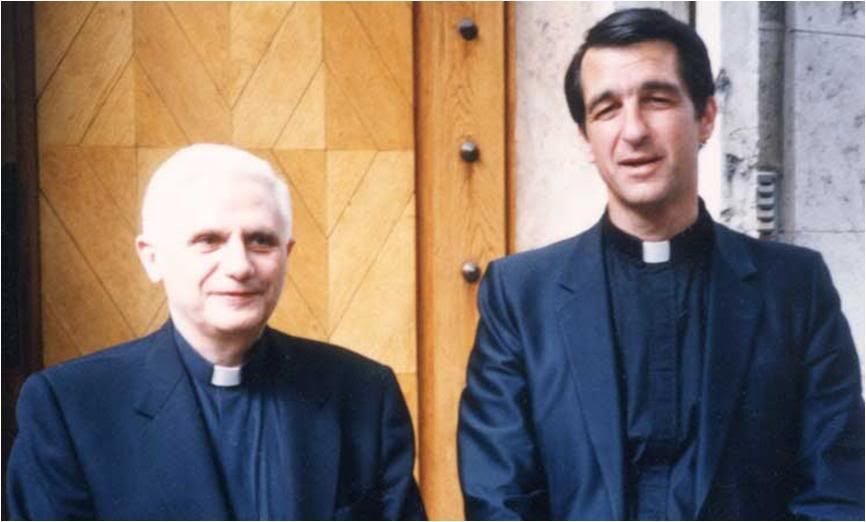 Fr. Fessio with Cardinal Ratzinger in 1999. Fessio earned his doctorate in theology in Regensburg in 1975.
Fr. Fessio with Cardinal Ratzinger in 1999. Fessio earned his doctorate in theology in Regensburg in 1975.
It is a topic that has previously turned up with some controversy in the Ratzinger Pontificate. In December 2007, the Congregation for the Doctrine of the Faith issued a Note on some 'doctrinal aspects of evangelization'.
The note condemned relativism and undifferentiated pluralism in which all positions are seen to be equal to each other, and stated unequivocally the justification for the Church's evangelizing mission towards non-Catholics.
According to the Note, which explicitly set out to clarify statements by the Second Vatican Council, the Church's announcement of Christ was not an unwarranted interference in the lives of non-Catholics but simply a proclamation of Christian truth.
As has become customary at these annual Schuelerkreis seminars, ex-Prof. Ratzinger himself will deliver the concluding address, generally summing up what has been discussed in the seminar.
Equally customary, the seminar has invited two resource persons to deliver the keynote lectures - the Protestant theologian Peter Beyerhaus from the University of Tuebingen; and an ex-Lutheran, now-Catholic theologian, Horst Buerkle, emeritus professor of the Ludwig-Maximilian University of Munich.
It is not unusual for the seminar to invite non-Catholic resource speakers. In this case, the ecumenical implications of Catholic mission are integral to the discussion - specifically, how the Catholic Church carries out its mission with respect to other Christian denominations.
A regular presence at these seminars is Cardinal Christoph Schoenborn, Archbishop of Vienna, who took advanced courses in theology under Prof. Ratzinger in Regensburg in 1972, but he subsequently obtained his doctorate in theology from the University of Paris. He is president of the Joseph Ratzinger-Benedict XVI Foundation incorporated last year by the Schuelerkreis in order to promote the thought and theology of Joseph Ratzinger/Benedict XVI institutionally.
Fr. Fessio, tell us about this year's seminar theme.
This year, it is about mission, The two principal speakers are Prof. Peter Beyerhaus and Prof. Heinz Buerkle.
Prof. Beyerhaus will speak on "Missione ad Gentes - Its justification and its form today", while Prof. Buerkle will speak on "The Church andts mission in dialog with men and with different religions and cultures".
Usually, these lectures are presented separately, with everyone present, including the Holy Father. After each presentation, there are questions, comments, discussions, in which the Holy Father also takes part, and in the end, he gives a summation of the session.
Who decides the seminar subject?
We've followed the same process every year. Before the year's meeting ends, the members suggest and discuss possible subjects for the following year. Then these are presented, in order of preference, to the Holy Father who chooses his preference. Then, the officials of the Schuelerkreis decide, along with the Holy Father, whom to invite as speakers.
How did these encounters come about initially?
They started after Prof. Ratzinger was named Archbishop of Munich-Freising in 1977. He let us know that he was receptive to such encounters, and since then, he always found time for an annual reunion.
After he became Pope, we all thought that it was the end of these annual meetings, but he himself proposed that they should continue.
In between sessions, what do you do? Do you lunch with the Pope? Do you have a chance to chat with him?
We have coffee and cake, and we chat among ourselves and with the Holy Father. Usually, we have at least one meal with him - lunch, and sometimes, breakfast.
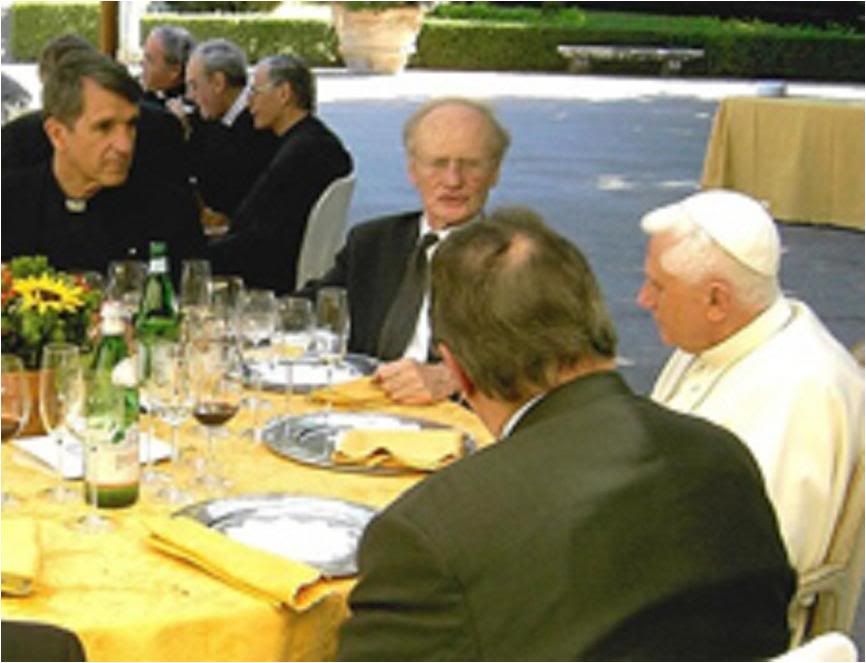 Lunch with the Pope, 2007 seminar. In the center is philosopher Robert Spaemann, who was one of the lecturers; Fr. Fessio is ne the left.
What do you remember of Prof. Ratzinger before he became Pope? Do you have any particular memories?
Lunch with the Pope, 2007 seminar. In the center is philosopher Robert Spaemann, who was one of the lecturers; Fr. Fessio is ne the left.
What do you remember of Prof. Ratzinger before he became Pope? Do you have any particular memories?
I have many memories of Joseph Ratzinger, but none that would shed new light on him nor on how the world knows him now.
As everyone can see. he is a person who is very transparent, very clear. One of the great joys that we his students felt when he was elected Pope was to know that finally, the world would know him as he is and as we know him, the true Joseph Ratzinger, not at all the Panzerkardinal, but a gracious, kind, and attentive scholar, priest and friend.
What has remained of your work from previous years? Have you continued working on the subjects you have discussed?
In the past two years, we have started to publish the lectures and discussions during the seminars. But as far as I know, there has been no formal follow-through of seminar topics.
For Ignatius Press, of which I am the publisher, there have been two concrete results. After the lecture by Fr. Samir Khalil Samir on Islam at the 2005 seminar, we decided to publish his book 101 questions on Islam. We also published Chance or Purpose?, a book written by Cardinal Schoenborn after the first seminar on 'creation and evolution'. [And afterwards, the English edition of 'Creation and Evolution', the proceedings of the 2007 seminar.]
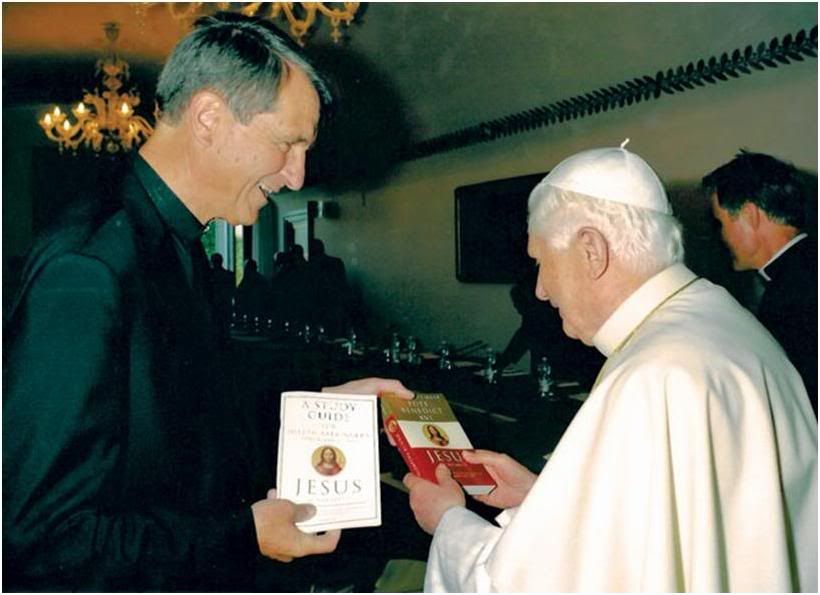 At the 2008 seminar, Fr. Fessio presented the Pope with Ignatius Press's paperback edition of Jesus of Nazareth and a Study Guide for it.
At the 2008 seminar, Fr. Fessio presented the Pope with Ignatius Press's paperback edition of Jesus of Nazareth and a Study Guide for it.
[Modificato da TERESA BENEDETTA 14/09/2009 21:01] |
| |
|
| |
 16/08/2009 12:19 16/08/2009 12:19 |
|
| | | OFFLINE | | Post: 18.176
Post: 834 | Registrato il: 28/08/2005
Registrato il: 20/01/2009 | Administratore | Utente Senior | |
|

Sunday, August 16
 St. Stephen (Istvan) (Hungary, 975-1038)
St. Stephen (Istvan) (Hungary, 975-1038)
First King of Hungary
No OR today.
(Yesterday was a religious holiday)
THE POPE'S DAY
Sunday Angelus.
|
| |
 16/08/2009 14:02 16/08/2009 14:02 |
|
| | | OFFLINE | | Post: 18.177
Post: 835 | Registrato il: 28/08/2005
Registrato il: 20/01/2009 | Administratore | Utente Senior | |
|
 ANGELUS TODAY
ANGELUS TODAY

 Here is a translation of the Holy Father's words at the Angelus today:
Here is a translation of the Holy Father's words at the Angelus today:
Dear brothers and sisters:
Yesterday we celebrated the great feast of Mary's Assumption to heaven, and today we read in the Gospel these words of Jesus: "I am the living bread that came down from heaven" (Jn 6,51).
One cannot but be struck by this correspondence which revolves around the symbol of 'heaven': Mary was 'assumed' into the place from where her Son had 'descended'.
Of course, this language, which is Biblical, expresses figuratively something which can never enter completely into the world of our ideas and our images.
But let us stop a moment to reflect: Jesus presents himself as the 'living bread', that is, the nourishment which contains the life of God himself, and he is able to communicate this to whoever eats of Him, the true food that gives life and truly nourishes us profoundly.
Jesus says: "Whoever eats this bread will live forever; and the bread that I will give is my flesh for the life of the world" (Jn 6,51).
And from whom did the Son of God take 'flesh' - his concrete earthly humanity? He took it from the Virgin Mary. God assumed from her his human body in order to enter into our mortal condition.
In turn, at the end of her earthly existence, the body of the Virgin was assumed into heaven by God and made to enter into the celestial condition.
It is a sort of exchange, in which God always has the full initiative, but as we have discussed on other occasions, he needed Mary, in a certain sense - he needed the Yes of his creature, her flesh, her concrete existence, in order to prepare the material of his sacrifice: his body and blood to offer on the Cross as an instrument of eternal life, and in the sacrament of the Eucharist, as spiritual food and drink.
Dear brothers and sisters, what happened to Mary is also valid in other ways that are just as real for every man and woman, because God asks each of us to welcome him, to place our hearts and bodies at his disposition, our entire existence, our flesh, as the Bible says - so that He may dwell in the world.
He calls us to unite with him in the sacrament of Eucharist, bread that is broken for the life of the world, so that together we may constitute the Church, his historical Body.
If we say Yes, as Mary did, then to the degree itself that we say Yes, the mysterious exchange also takes place for us and in us: we are assumed into the divinity of Him who assumed our humanity.
The Eucharist is the means, the instrument, for this reciprocal transformation, which always has God as the end and as principal actor: He is the Head and we are the members; He is the Vine and we are the shoots.
Whoever eats of this Bread and lives in communion with Jesus, allowing himself to be transformed by him and in him, is saved from eternal death: certainly, he will die like everyone, taking part in the mystery of the passion and Cross of Christ, but he is no longer a slave to death, and will rise on the last day to partake of the eternal feast with Mary and all the saints.
This mystery, this feast of God, starts down here: it is a mystery of faith, hope and love, celebrated in life and in liturgy, especially in the Eucharist, and is expressed in fraternal communion and service to our neighbor.
Let us pray to the Blessed Virgin so that she may help us nourish ourselves in faith with the Bread of eternal life in order to experience now on earth the joy of heaven.
In English, he said:
I greet all the English-speaking pilgrims and visitors present at today’s Angelus. May your time here at Castel Gandolfo and in Rome deepen your faith in our Lord, the living bread, who brings us the gift of eternal life. Upon you and your families I invoke Almighty God’s abundant blessings of joy and peace!
WOW! Another precious gem of homiletic art from the Pastor of the Universal Church!
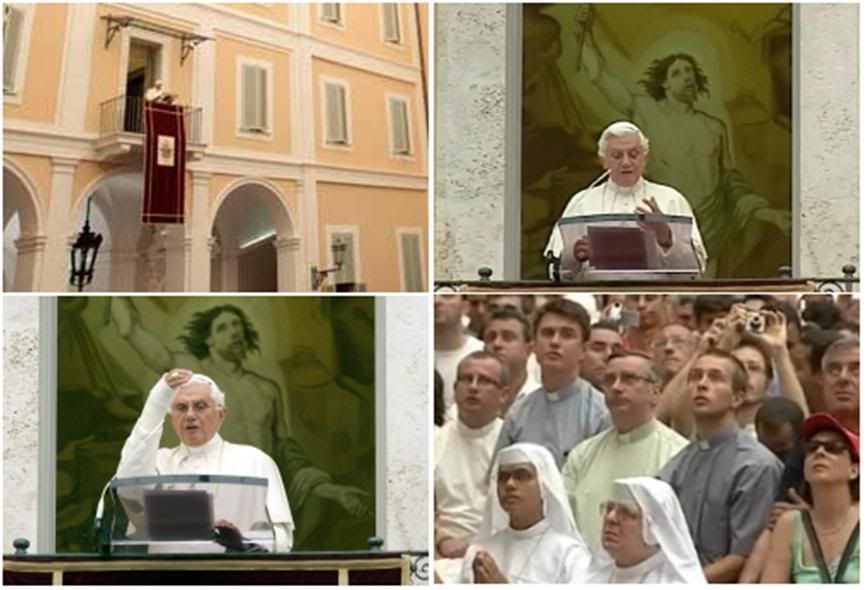
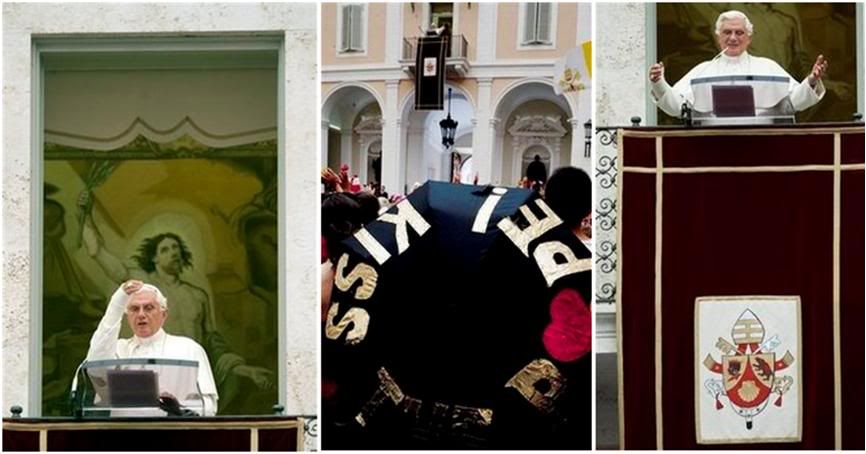

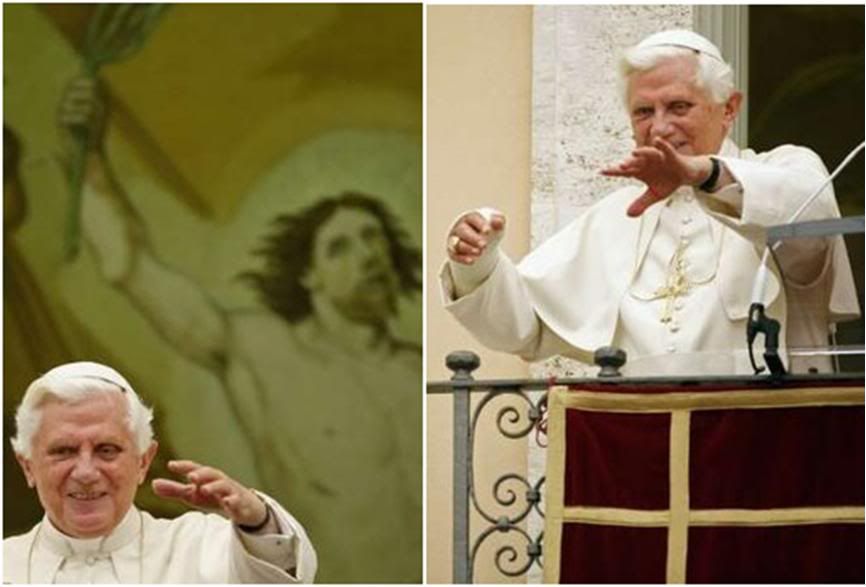
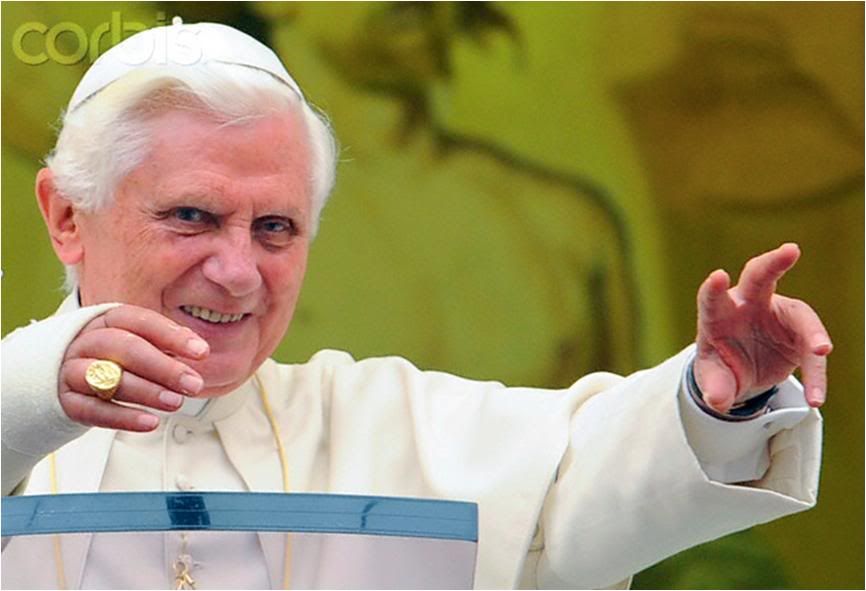
 Three cheers for the Benaddict who thought up the umbrella!
Three cheers for the Benaddict who thought up the umbrella!
Imagine if a congregation of Benaddicts showed up at St. Peter's or CG using such umbrellas!
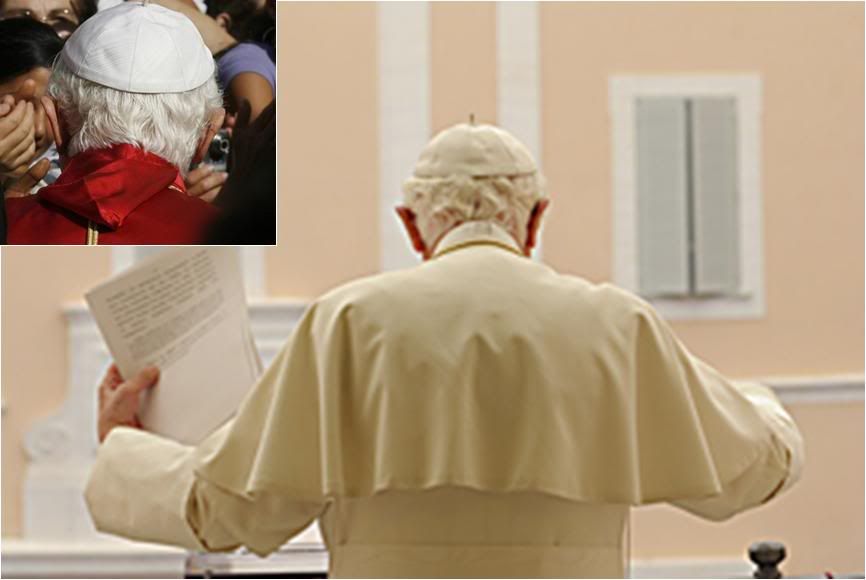 Thanks to OR for this unusual 'view' of Papino's hair; inset is a similar rear view taken Sunday.!
Thanks to OR for this unusual 'view' of Papino's hair; inset is a similar rear view taken Sunday.!
[Modificato da TERESA BENEDETTA 18/08/2009 04:23] |
| |
 17/08/2009 11:23 17/08/2009 11:23 |
|
| | | OFFLINE | | Post: 18.209
Post: 867 | Registrato il: 28/08/2005
Registrato il: 20/01/2009 | Administratore | Utente Senior | |
|

Monday, August 17
 ST. JEANNE DELANOUE (France, 1666-1736)
ST. JEANNE DELANOUE (France, 1666-1736)
(St. Joan of the Cross, canonized 1982)
Founder, Sisters of St. Anne of Providence
No OR today.
No events scheduled for the Holy Father today.
Major appointment
at Secretariat of State
Andrea Tornielli in today's Il Giornale anticipates the announcement today of the nomination of Mons. Pietro Parolin as Apostolic Nuncio to Venezuela, with the rank of Archbishop.
Parolin was the Vatican's 'deputy foreign minister' as under secretary to Mons. Dominique Mamberti, deputy Secretary of State for foreign relations.
He will be replaced by Mons. Ettore Balestrero, who has been in charge of the European desk at State, particularly the presence of the Church in a secularized Europe.
Parolin will be among the new Apostolic Nuncios to be consecrated Archbishop by Pope Benedict XVI on Sept. 12 at St. Peter's Basilica.
The official Vatican bulletin has now confirmed the above.
[Modificato da TERESA BENEDETTA 18/08/2009 03:02] |
| |
 18/08/2009 13:07 18/08/2009 13:07 |
|
| | | OFFLINE | | Post: 18.217
Post: 874 | Registrato il: 28/08/2005
Registrato il: 20/01/2009 | Administratore | Utente Senior | |
|

Tuesday, August 18
 ST. JEANNE FRANCOISE CHANTAL (France, 1562-1641)
ST. JEANNE FRANCOISE CHANTAL (France, 1562-1641)
Widow and Founder, Order of the Visitation
OR for 8/17-8/18:

At his homily on the Feast of the Asssumption, the Pope recalls Mary's calling in the footsteps of Jesus:
'Christian life is a hastening towards God'
The issue contains the texts of the Assumption homily and the Angelus messages on Saturday and Sunday. Other Page 1
stories: Japan's economy appears to be recovering but the stock markets don't seem to agree[/DIM}[once again, the OR makes
a snap judgment on an inherently fluid situation];Afghan presidential elections hostage to the Taliban?; in the Berlin world athletics
meet, Jamaica's Usain Bolt runs the 100 meters in 9.58 seconds beating the 9.69 he set in Beijing last year.
No events scheduled for the Holy Father today.
PAPAL REPRESENTATIVE
The Vatican announced that Pope Benedict XVI has named Cardinal Franc Rode, Prefect
of the Congregation of the Institutes of Consecrated Life as his personal representative
to the 12th centenary celebration of the transfer of the relics of St. Tryphon to Kotor
in Montenegro.
[Modificato da TERESA BENEDETTA 18/08/2009 13:14] |
| |
 19/08/2009 00:00 19/08/2009 00:00 |
|
| | | OFFLINE | | Post: 18.224
Post: 881 | Registrato il: 28/08/2005
Registrato il: 20/01/2009 | Administratore | Utente Senior | |
|
 The Pope's envoy to the bishops of Asia:
The Pope's envoy to the bishops of Asia:
'We cannot celebrate the Eucharist
while tolerating social discrimination'
Translated from
the 8/19 issue of

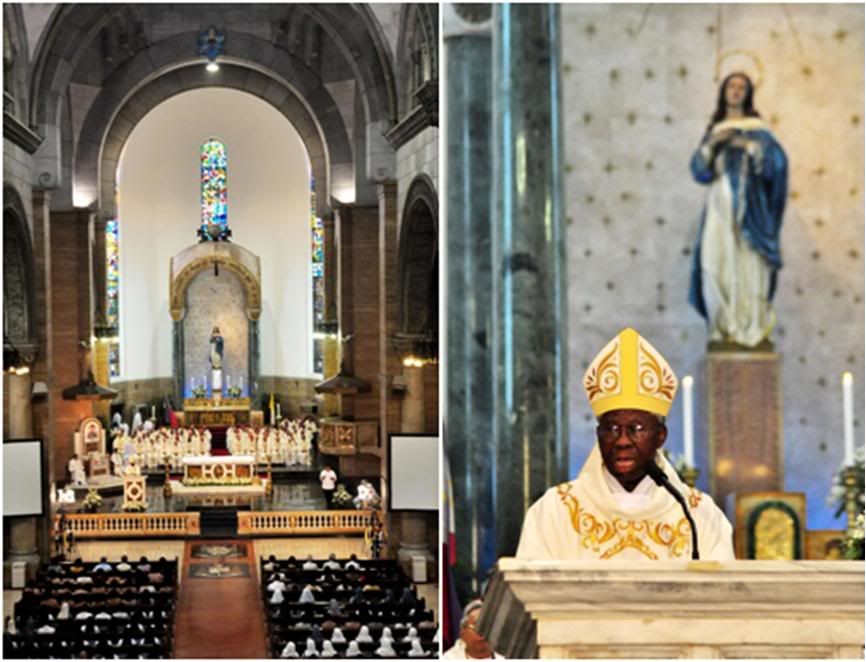
 Cardinal Arinze celebrated the concluding Mass of the ninth Asian bishops' assembly at the Cathedral of Manila.
Cardinal Arinze celebrated the concluding Mass of the ninth Asian bishops' assembly at the Cathedral of Manila.
"We cannot celebrate the Eucharist, and at the same time, maintain, practise or tolerate discrimination on the basis of religion, race or culture, of language, caste or class".
This was one of the messages of Cardinal Francis Arinze. on behalf of Pope Benedict XVI, who named him his personal representative to the ninth Plenary Assembly of the Federation of Asian Bishops' Conferences (FABC) held in Manila, Philippines, from August 11-16.
In his homily at the concluding Mass of the assembly, Cardinal Arinze addressed all the Churches of Asia, with an invitation to open up dialog with everyone in order to "construct bridges in a world which is increasingly divided", even as he reaffirmed the Church's commitment to close ranks with the poor and the needy.
The Cardinal took up the essential points that emerged in the discussions.
The emeritus Prefect of the Congregation for Divine Worship reproposed the centrality of Eucharistic worship in the liturgy and life of the Church.
He pointed out that "Asian cultures possess a profound sense of the sacred and the transcendent. It should therefore not be too difficult to conserve and elevate this cultural trait to honor Jesus in the Eucharist".
Regarding liturgy, Cardinal Arinze urged a greater attention to the ars celebrandi: everyone, he said, "starting with the clergy, should be able to appreciate the richness of signs and symbols, the texts, the readings, the music, the garments, and colors, of gestures and of silence".
About new churches, the cardinal said they should "clearly demonstrate" the centrality of the elements that characterize liturgy, such as the altar, the tabernacle, the central crucifix, the cathedra, the pulpit."
He also warned against abuses and 'individual idiosyncrasies' in the distribution of Communion.
The cardinal pointed out that the Second Vatican Council urged "a healthy inculturation of the liturgy" but it set strict guidelines for such inculturation.
"Faith, adoration and reverence lead to a correct ars celebrandi, which is precisely the art of celebrating the Eucharist correctly. It is the fruit of faithful adherence to liturgical norms in all their richness.
"When the Eucharistic celebration is correctly done, it demonstrates the eucharistic faith of the Church. It nourishes the faith of the Massgoers who must go home with an enthusiasm for life and an urge to share their faith."
Thus, the Pope's representative called on the bishops and the clergy to pay the most careful attention to the celebration of the Eucharist, following liturgical norms and avoiding questionable or erroneous innovations.
"The faithful," he said, "do not come to Mass for recreation, but to adore God, to praise him and to thank him".
He reminded the bishops of their task as being "responsible for the
liturgy celebrated in their own diocese", recommending that they should have liturgical commissions and permanent courses of formation.
After six days of debate on the theme "Living the Eucharist in Asia", bishops of the continent directed an appeal to all Catholics "for unity in diversity, to listen to the Word of God, calling them to faith and hope, adn to mission".
The Asian bishops consigned a copy of their final document to Cardinal Arinze for the Pope.
In their final message, the Asian prelates said the Eucharist is "the most effective missionary activity" that the ecclesial community can carry out.
"To celebrate the Eucharist means to live a faith that is rooted, cultivated and nourished by the Word of God" and is also "a living answer to the uncertainties and sufferings which afflict the world".
The bishops said that Eucharist and the Word of God are the main ways to establish a true dialog with Asian societies, which are characterized by religious and cultural pluralism.
The Mass as a Eucharistic celebration, the final document says, "has the power to make the Christian community a vigorous witness for Christ" and allows undertaking an authentic 'dialog of life' with believers in other faiths.
The bishops point out that so many practical guidelines to this end were generated by the last two general assemblies of the Bishops' Synod under Benedict XVI, precisely on the subjects of the Eucharist and the Word of God.
During the sessions, Archbishop Orlando Quevedo, a Filipino who is secretary general of the FABC, pointed out that today more than ever, Christianity in Asia "needs continuing renewal" and the "construction of true local Churches" that are capable of dialog with different cultures, religions and peoples.
He suggested this required new initiatives, especially in places where "the silent testimony of faith is the only way to proclaim the Kingdom of God".
Asia, he said, is fertile ground for Christian dialog on many counts: because of its "brilliant mosaic of ancient cultures which have contributed to world civilization"; as the birthplace of the most ancient religious traditions in the world (Hinduism, Buddhism, Christianity and Islam); and with "millions of persons who live in need and represent two thirds of all the world's poor".
In order to carry forward an open dialog on all fronts and in all directions, Quevedo said, the Church urgently needs formation of the laity in addition to educating the youth.
Archbishop Thomas Menamparampil of Gujarati, India, pointed out for his part that Christians in Asia, though very much in the minority, can make a difference if they live their faith in joy, and "with courage and passion".
He said that if the Christian faith is lived fully and made credible, then it can best contribute to fight poverty, intolerance, persecution and discrimination.
In paying tribute to the Christian victims of recent violence in Asia, Mons. Menamparampil [whom Pope Benedict XVI had asked to write the Good Friday meditations for the Colosseum Way of the Cross this year], he said their plight only emphasizes how much Asia needs local Churches that are strong and bring credible witness; and that they can contribute to the transformation of society if they are able to propose "an experience of God characterized by authenticity, sincerity, announcing the Gospel with words that are shown in deeds, and committing themselves fearlessly for the common good".
[Modificato da TERESA BENEDETTA 19/08/2009 00:04] |
| |
 19/08/2009 02:09 19/08/2009 02:09 |
|
| | | OFFLINE | | Post: 18.225
Post: 882 | Registrato il: 28/08/2005
Registrato il: 20/01/2009 | Administratore | Utente Senior | |
|

 Giuliano Ferrara today wrote a lengthy artucle responding to three main positions advocated publicly by ex-anarchist Adriano Sofri, now editorial writer for the anti-Church, anti-Benedict La Repubblica, among other things, also expressed in letters to the editor at Il Foglio, i.e., Ferrara himself.
Giuliano Ferrara today wrote a lengthy artucle responding to three main positions advocated publicly by ex-anarchist Adriano Sofri, now editorial writer for the anti-Church, anti-Benedict La Repubblica, among other things, also expressed in letters to the editor at Il Foglio, i.e., Ferrara himself.
The positions disputed by Ferrara are: 1) that the development of supposedly painless abortion methods - like the abortifacient pill RU-486 - is to be considered as 'great and authentic progress'; 2) that Islamist terrorism cannot be considered a form of nihilism; and 3) that Il Foglio is a compromised newspaper, presenting a homogeneous content in 'conscious service of the reigning hierarchy of the Church and its head, the Pope".
For now, I will translate only Ferrara's answer to the third point. It is one of the most beautiful brief tributes to Benedict XVI that I have read. (Among the Italians who write about the Pope and the Church today, I like Ferrara best not only because I find his views most congenial, but because he is so literate. And because he edits a daily newspaper, he is able to speak out on every issue that is of interest to us who follow Benedict's press closely.)
Speaking up for Church positions
and for the Pope
by Giuliano Ferrara
Translated from

August 18, 2009
That Il Foglio is a compromised newspaper, presenting a homogeneous content in conscious service of the reigning hierarchy of the Church and of its head, the Pope:
With an ethical and political program, one must add, that is paradoxically incarnated by fervent believers, traditionalists and by non-believers alike in the name of a transcendent truth of which the Bishop of Rome is the repository.
We are not compromised, and our homogeneity is in our method, in our freedom and not uniformity of tone.
For me - who treads heavily like an elephant [because of his girth, Ferrara refers to himself as the Elefantino] but keeps together the savage forest that the newspaper is - the last two Popes were king of the world and a philosopher-king, respectively.
On the day that Benedict XVI was elected, our lucky headline had been 'The formidable lesson (lezione) of Professor Ratzinger' about his 'dictatorship of relativism' homily just before the Conclave.
And the following day, reporting on the outcome of the Conclave, all we had to do was add a single letter to the previous headline to read, 'The formidable election (elezione) of Professor Ratzinger'.
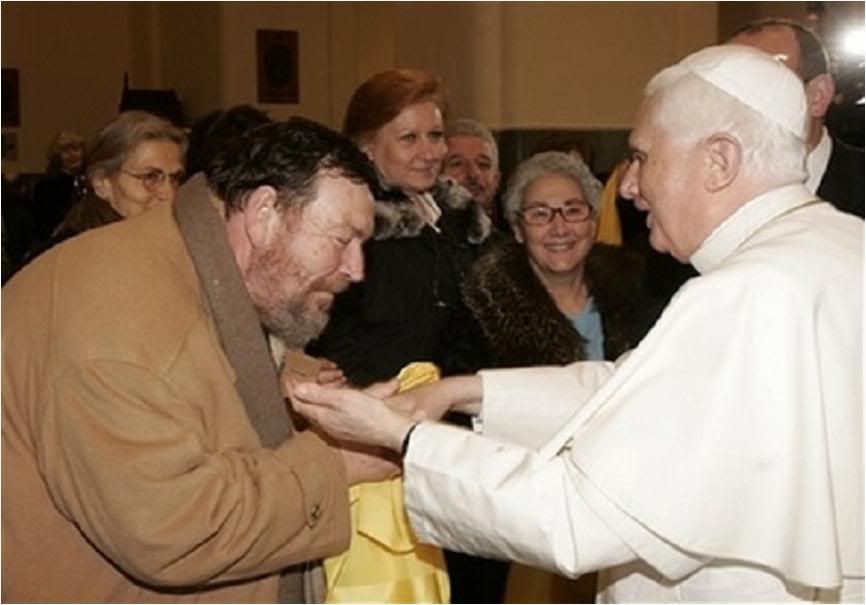 Ferrara and Pope Benedict after the Mass celebrated by the Pope at Santa Maria Liberatrice in Rome on February 24, 2008. Ferrara lives in the neighborhood and attended the Mass.
Ferrara and Pope Benedict after the Mass celebrated by the Pope at Santa Maria Liberatrice in Rome on February 24, 2008. Ferrara lives in the neighborhood and attended the Mass.
This is to say that I like everything about the professor-Pope, without exception. That I love him and favor him particularly, that I recognize in him an elevated authority - mental, cultural, spiritual, moral and secularly prophetic - that however, I do not mistake for the non-existent seal of canoncal power over someone like me who is not a Catholic and not even a believer.
But there is the strong charism of a man of the Church who understands our time, who is devoid of sentimentality, who has found a modern way of uniting mind and heart in preaching the rationality of his faith and in revealing the truth in tradition, a Pope who is acting to stem those tragic perils that you yourself (Sofri] refer to in your letters, at least in those passages where you write about the violation of the human and of the individual.
That all this devotion may be seen as secular obedience given freely to an institution with bimillenary weight should not be surprising.
That such devotion is amplified - and sometimes made harsh - by the rather coarse programs of conformist de-Christianization in our day, and by the secular pretext of arrogating every thought, every freedom and every social autonomy to itself, is also undeniable.
That such an undertaking is possible only because of the convergence of many different human and historical circumstances - arrogant secularism, febrile faiths, and so many other elements - this, too, should not be surprising.
Otherwise, your image of our newspaper as an enemy banner in no-man's land is perfect, and quite flattering.
[Modificato da TERESA BENEDETTA 10/08/2010 21:30] |
| |
 19/08/2009 14:34 19/08/2009 14:34 |
|
| | | OFFLINE | | Post: 18.228
Post: 885 | Registrato il: 28/08/2005
Registrato il: 20/01/2009 | Administratore | Utente Senior | |
|


FOUR YEARS, FOUR MONTHS, AND COUNTING....
AD MULTOS ANNOS, SANCTO PATER!
THANK YOU FOR ALL YOU ARE
TO THE CHURCH, TO THE WORLD, TO ALL OF US.

Wednesday, August 19
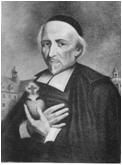 ST. JEAN (JOHN) EUDES (France, 1601-1680)
ST. JEAN (JOHN) EUDES (France, 1601-1680)
Founder, Society of Jesus and Mary (Eudists)
and SisterS of Our Lady of Charity
OR today.
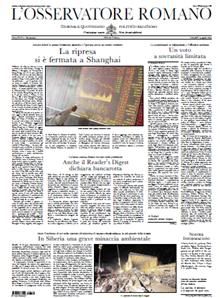 No papal stories on Page 1. In the inside pages, a report from Manila
No papal stories on Page 1. In the inside pages, a report from Manila
and Cardinal Arinze's message at the closing of the plenary assembly
of the Federation of Asian Bishops' Conferences in Manila, at which
he was the Pope's personal representative (translated in earlier
poat on this page). Page 1 stories: Global stock markets waver;
Afghan presidential elections tomorrw under Taliban threat; serious
environmental threat in Siberia after an accident at Russia's largest
hydroelectric plant (4th largest in the world): a transformer explosion
caused at least a dozen deaths and dozens missing and presumed dead,
but it also released combustible oil into Siberia's largest river,
the Yenisei, where it has spread over an area of 25 square kms; 1200
experts have been mobilized to clean up, but they think it will take
at least 4 years to do so.
THE POPE'S DAY
General Audience today - The Holy Father spoke on the need
for the proper formation of priests to advance the mission of
the Church.
[Modificato da TERESA BENEDETTA 19/08/2009 14:57] |
| |
 19/08/2009 14:51 19/08/2009 14:51 |
|
| | | OFFLINE | | Post: 18.229
Post: 886 | Registrato il: 28/08/2005
Registrato il: 20/01/2009 | Administratore | Utente Senior | |
|

 GENERAL AUDIENCE TODAY
GENERAL AUDIENCE TODAY
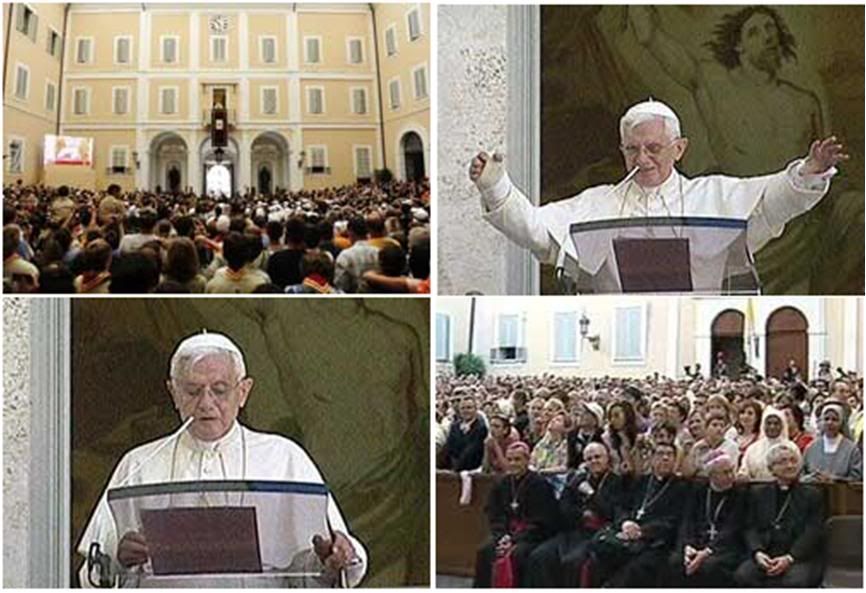
From a window overlooking the inner courtyard of the Apostolic Palace at Castel Gandolfo, the Holy Father held his General Audience today.
His catechesis was on St. John Eudes, whose feast the Church marks today, and whom the Holy Father cited as a model for priests and for his work in the formation of priests.
Here is what the Pope said in English:
I offer a warm welcome to the English-speaking visitors present at today’s Audience, including the pilgrims from India and Nigeria.
Our catechesis considers Saint John Eudes whose feast we celebrate today. He lived in seventeenth-century France which, notwithstanding considerable trials for the faith, produced many outstanding examples of spiritual courage and insight.
Saint John Eudes’s particular contribution was the foundation of a religious congregation dedicated to the task of giving solid formation to the diocesan priesthood.
He encouraged seminarians to grow in holiness and to trust in God’s love, revealed to humanity in the priestly heart of Jesus and in the maternal heart of Mary.
During this year, let us pray in a special way for priests and seminarians that, inspired by today’s saint, they may spiritually "enter into the heart of Jesus", becoming men of true love, mercy, humility and patience, renewed in holiness and pastoral zeal. My dear Brothers and Sisters, upon you and your families I invoke God’s blessings of joy and peace!

 Here is a full translation of the Holy Father's catechesis:
Here is a full translation of the Holy Father's catechesis:
Dear brothers and sisters:
Today is the liturgical feast of St. Jean Eudes, tireless apostle of devotion to the Sacred Hearts of Jesus and Mary, who lived in 17th century France, a century marked by opposing religious phenomena and also of serious political problems.
It was the time of the Thirty Years' War which devastated not just a great part of Central Europe but also many souls. While contempt for the Christian faith was being propagated by the dominant culture of the time, the Holy Spirit inspired a spiritual renewal full of fervor, with outstanding personalities like De Berulle, St. Vincent de Paul, St. Louis Grignon de Montfort and St. Jean Eudes.
This great 'French school' of saintliness would bear later fruit in men like St. Jean Marie Vianney.
By a mysterious design of Providence, my venerated predecessor Pius XI proclaimed Jean Eudes and the Cure d'Ars saints on the same day, on May 31, 1925, offering the Church and the whole world two extraordinary examples of priestly saintliness.
In the context of the Year for Priests, I wish to underscore the apostolic zeal of St. Jean Eudes, who was particularly dedicated to the formation of diocesan clergy.
The saints are the true interpreters of Holy Scripture. The saints have proved, in their experience of life, the truth of the Gospel - and thus they introduce us to know and understand the Gospel.
The Council of Trent, in 1563, had issued the norms for the establishment of seminaries and for the formation of priests, insofar as the Council was well aware that all the crises of the Protestant Reformation were conditioned by the insufficient training of priests, who where not correctly prepared for priesthood, neither intellectually nor spiritually, in their heart and soul.
That was in 1563. But since the application and realization of such guidelines came late in Germany as well as in France, St. Jean Eudes saw the consequences of such lack of formation.
Moved by a lucid awareness of the urgent need for spiritual assistance towards the faithful because of the inadequacies of a great part of the clergy, the saint, who was a parish priest, instituted a congregation dedicated specifically to the formation of priests.
In the university city of Caen, he founded his first seminary, which was so appreciated that soon he extended the work to other dioceses.
The path of saintliness followed by him and proposed to his disciples was based on a solid trust in the love that God revealed to mankind in the priestly Heart of Christ and the maternal Heart of Mary.
During that time of cruelty, of the loss of interiority, he addressed himself to the heart, in the words of a psalm well interpreted by St. Augustine.
He wanted to call back the faithful, particularly future priests, to the heart, inspired by the priestly Heart of Jesus and the maternal Heart of Mary. Of this love in the hearts of Christ and Mary, every priest, he felt, should be a witness and an apostle.
And so we come to our time. Even today we note the need for priests to bear witness to the infinite mercy of God, with a life 'conquered' wholly by Christ, and they must learn this during their years of preparation in the seminary.
Pope John Paul II, after the Synod of 1990, issued the Apostolic Exhortation Pastores dabo vobis in which he renewed the norms of the Council of Trent and updated them, underscoring above all the necessary continuity between the initial moments and the permanent years of formation.
This, for him and for us, is the true point of departure for an authentic reform of the life and apostolate of priests. It is also the crucial element so that the 'new evangelization' may be not just an attractive slogan but can be translated into reality.
The foundations laid during formation in the seminary constitute that irreplaceable humus spirituale in which to 'learn Christ', allowing oneself to be progressively conformed to him, the only Supreme Priest and Good Shepherd.
The time in the seminary should be considered like the time when the Lord Jesus, after having called the Apostles, and before sending them forth to preach, asked them to stay with him (cfr Mk 3,14).
When St. Mark narrates the calling of the twelve Apostles, he tells us that Jesus had a twofold purpose: the first was that they should be with him, and the second was that he should send them forth to preach.
But in being with him, they were really announcing Christ and carried the reality of the Gospel to the world.
During this Year for Priests, I ask you to pray, dear brothers and sisters, for the priests and all who are preparing to receive the extraordinary gift of the priestly ministry.
To all, I address, concluding this catechesis, the exhortation of St. Jean Eudes who told his priests: "Give yourselves to Jesus, enter the immensity of his great Heart, which contains the Heart of his Blessed Mother and all the saints, and lose yourself in that abyss of love, of charity, of mercy, of humility, of purity, of patience, of submission and of holiness" (Coeur admirable, III, 2).
And in this sense, let us now sing together the Our Father in Latin.

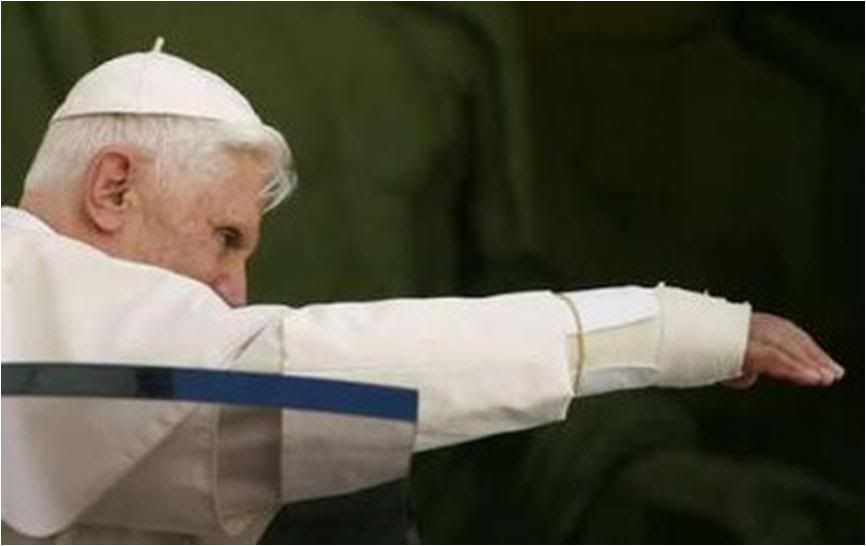
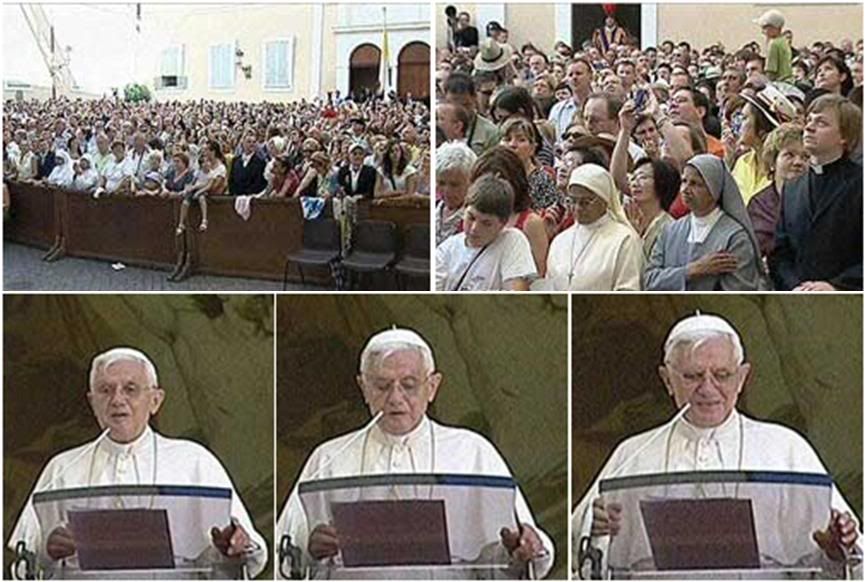

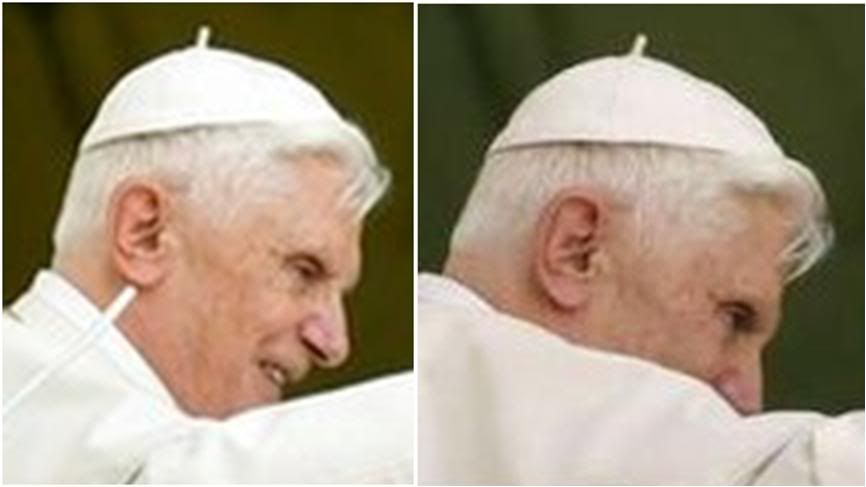
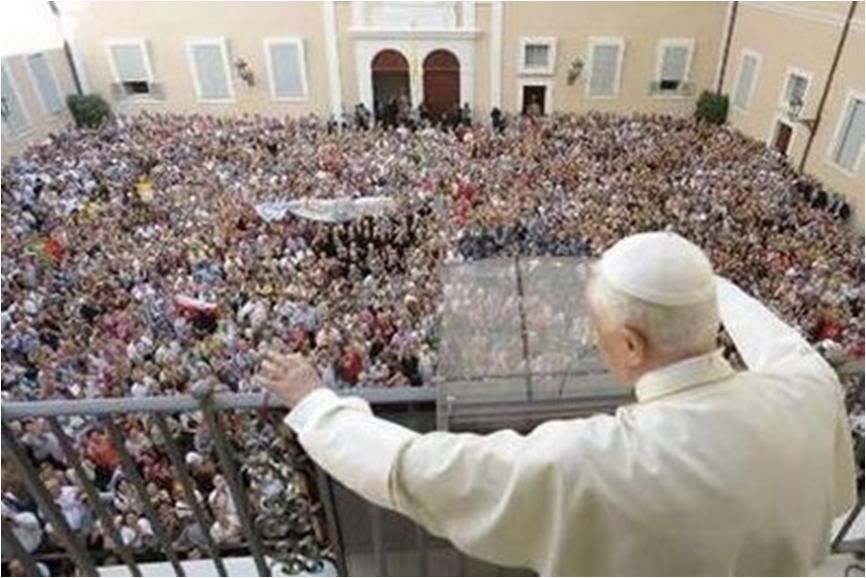
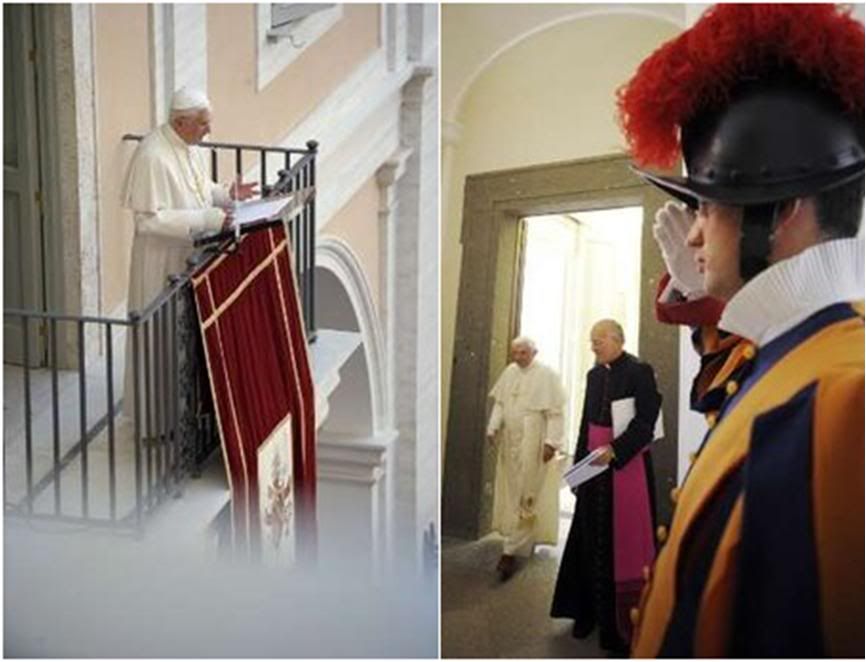
[Modificato da TERESA BENEDETTA 20/08/2009 15:14] |
| |
 20/08/2009 14:59 20/08/2009 14:59 |
|
| | | OFFLINE | | Post: 18.231
Post: 888 | Registrato il: 28/08/2005
Registrato il: 20/01/2009 | Administratore | Utente Senior | |
|

Thursday, August 20
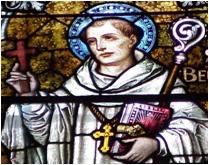 ST. BERNARD OF CLAIRVAUX (France, 1090-1153)
ST. BERNARD OF CLAIRVAUX (France, 1090-1153)
Cistercian reformer and Abbot
Doctor of the Church
OR today.
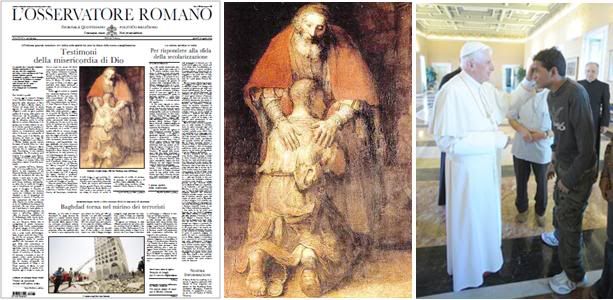 Illustration: Rembrandt, The Prodigal Son, 1666, Hermitage Museum.
Illustration: Rembrandt, The Prodigal Son, 1666, Hermitage Museum.
At the General Audience, Benedict XVI says the key to 'new evangelization' is the holiness of priests:
Witnesses to God's mercy
Right photo: The Pope meets Rajiv Janine, 18, of Sri Lanka, vistim of a train accident, who was fitted with prosthetic arms and legs
with the help of an Italian parish priest. [Will post story in BENADDICTIONS].
Other Page 1 stories: An editorial commentary on Italy's Catholic culture and how it must respond to the challenges
of secularization; Baghdad hit by worst terror bombings in over a year; and teasers about UN concerns on safeguarding
voting places as Afghans vote in presidential elections today; and a meeting in Washington between President Obama
and Egypt's President Mubarak.
No events scheduled for the Holy Father today.
[Modificato da TERESA BENEDETTA 20/08/2009 15:00] |
| |
 20/08/2009 16:37 20/08/2009 16:37 |
|
| | | OFFLINE | | Post: 18.233
Post: 890 | Registrato il: 28/08/2005
Registrato il: 20/01/2009 | Administratore | Utente Senior | |
|
 Is Benedict in favor of world government?:
Is Benedict in favor of world government?:
A more careful look at what he wrote in CIV
by Douglas A. Sylva

August 20, 2009
From the FIRST THINGS symposium this week on CIV - a much-needed corrective to prevailing snap interpretations. Douglas A. Sylva is Senior Fellow at the Catholic Family and Human Rights Institute.
As observers continue to decipher the meaning of Benedict XVI’s latest encyclical, Caritas in Veritate, all appear to agree that the passage of note, the passage that may prove historic in its implications, is the one that is already becoming known as the “world political authority” paragraph:
In the face of the unrelenting growth of global interdependence, there is a strongly felt need, even in the midst of a global recession, for a reform of the United Nations Organization, and likewise of economic institutions and international finance, so that the concept of the family of nations can acquire real teeth.
One also senses the urgent need to find innovative ways of implementing the principle of the responsibility to protect and of giving poorer nations an effective voice in shared decision-making.
This seems necessary in order to arrive at a political, juridical and economic order which can increase and give direction to international cooperation for the development of all peoples in solidarity.
To manage the global economy; to revive economies hit by the crisis; to avoid any deterioration of the present crisis and the greater imbalances that would result; to bring about integral and timely disarmament, food security and peace; to guarantee the protection of the environment and to regulate migration: for all this, there is urgent need of a true world political authority. . . .
Could Benedict be in favor of world government, as many now believe?
Taken in the context of papal writings since the dawn of the UN, as well as Benedict’s own opinions, recorded both before and after his election as pope, the passage gains another meaning.
It is in reality a profound challenge to the UN, and the other international organizations, to make themselves worthy of authority, of the authority that they already possess, and worthy of the expansion of authority that appears to be necessary in light of the accelerated pace of globalization.
It is true that Benedict believes that a transnational organization must be empowered to address transnational problems. But so has every Pope since John XXIII, who wrote in 1963:
Today the universal common good presents us with problems which are worldwide in their dimensions; problems, therefore, which cannot be solved except by a public authority with power, organization, and means coextensive with these problems, and with a worldwide sphere of activity. Consequently the moral order itself demands the establishment of some such form of public authority.
But such an authority has been established, and we have lived with it since 1948, and in many ways it has disappointed.
So Benedict turns John XXIII’s formulation on its head: Morality no longer simply demands a global social order; now Benedict underscores that this existing social order must operate in accord with morality.
He ends his own passage on world authority by stating that “The integral development of peoples and international cooperation require the establishment of a greater international ordering, marked by subsidiarity, for the management of globalization. They also require the construction of a social order that at last conforms to the moral order. . . .” Note the phrase “at last.”
What went wrong? According to Benedict, a world authority worthy of this authority would need “to make a commitment to securing authentic integral human development inspired by the values of charity in truth.” The obvious implication is that the current UN has not made this commitment.
To understand how the UN has failed, we must delve into the rest of the encyclical. According to Benedict, the goal of all international institutions must be “authentic integral human development.” This human development must be inspired by truth, in this case, the truth about humanity.
Pursuit of this truth reveals that each human being possesses absolute worth; therefore, authentic human development is predicated on a radical defense of life.
This link is made repeatedly in Caritas in Veritate.
Openness to life is at the center of true development. . . . The acceptance of life strengthens moral fiber and makes people capable of mutual help. . . . They can promote virtuous action within the perspective of production that is morally sound and marked by solidarity, respecting the fundamental right to life of every people and individual.
To some, it must seem startling how often Benedict comes back to life in an encyclical ostensibly dedicated to economics and globalization.
But this must be understood as Benedict’s effort to humanize globalization. It can be seen as the global application of John Paul II’s own encyclical on life, Evengelium Vitae.
Without this understanding of the primacy of life, international development is bound to fail:
Who could measure the negative effects of this kind of mentality for development? How can we be surprised by the indifference shown towards situations of human degradation, when such indifference extends even to our attitude towards what is and is not human?
Throughout the encyclical, Benedict is unsparing in the ways in which the current international order contributes to this failure; no major front in the war over life is left unmentioned, from population control, to bioethics, to euthanasia.
But none of this should come as a surprise. Since at least as far back as the UN’s major conferences of the 1990s — Cairo and Beijing —Benedict has known that the UN has adopted a model of development conformed to the culture of death. He no doubt assisted John Paul II in his successful efforts to stop these conferences from establishing an international right to abortion-on-demand.
At the time, Benedict said, “Today there is no longer a ‘philosophy of love’ but only a ‘philosophy of selfishness.’ It is precisely here that people are deceived. In fact, at the moment they are advised not to love, they are advised, in the final analysis, not to be human. For this reason, at this stage of the development of the new image of the new world, Christians . . . have a duty to protest.”
Now, in his teaching role as Pope, Benedict is not simply protesting but offering the Christian alternative, the full exposition of authentic human development.
Whether or not the UN can meet the philosophical challenges necessary to promote this true development remains uncertain. But it should not be assumed that Benedict is sanguine; after all, he begins his purported embrace of world government with a call for UN “reform,” not expansion.
This one was an eye-opener for me on 'Catholic economics' in the context of the secular economics I was taught in university college (the two years of humanities and liberal arts that underpin the basic university education even for those who pursue a science degree).
A return to Augustinian economics
by John D. Mueller

August 20, 2009
John D. Mueller is director of the Economics and Ethics Program at the Ethics and Public Policy Center and president of LBMC LLC, an economic and financial market forecasting firm, both in Washington, DC.
Despite belonging to an organization that recently celebrated its founder’s two thousandth birthday, some American Catholics exhibit the attention span of fruit flies when their faith impinges on their politics.
Recent responses to Benedict XVI’s Caritas in Veritate closely parallel those that greeted the last economic encyclicals: John Paul II’s Sollicitudo rei socialis (On the Church’s cocial concern) and Centesimus Annus (On the hundredth anniversary) [of Leo XIII’ Rerum Novarum].
Caritas in Veritate was originally intended for 2007, the fortieth anniversary of Paul VI’s 1967 encyclical Populorum Progressio(The development of peoples), which first noted that “the social question has become worldwide” (PP, 3).
John Paul II promulgated Sollicitudo rei socialis in 1987, the twentieth anniversary of PP. Partisan contention about John Paul’s encyclical crystallized around a single paragraph: “The Church’s social doctrine is not a ‘third way’ between liberal capitalism and Marxist collectivism nor even a possible alternative to other solutions less radically opposed to one another: Rather, it constitutes a category of its own” (SRS, 41).
Catholics on both the left and the right have analyzed Benedict XVI’s latest encyclical with the same dichotomous logic they applied to SRS: The Church says there is no Third Way. If not, we must choose between the First Way of Adam Smith and the Second Way of Karl Marx.
But, by emphasizing in his new encyclical the central role of gifts in the divine economy of creation and salvation, as well as in personal, domestic, and political economy, Benedict XVI (like John Paul II before him) poses a very different choice.
Following that neglected economic realist St. Augustine (whom the Pope has called “my great master”) and Augustine’s contemporaries the Cappadocian Fathers, Benedict XVI says the choice is among the same three world views that confronted one another in the marketplace of Athens when the Apostle Paul (probably in a.d. 51) prefaced his proclamation of the gospel with a biblically orthodox adaptation of Greco-Roman natural law and “some Epicurean and Stoic philosophers argued with him” (Acts 17:18).
As Benedict XVI succinctly summarizes, “For believers, the world derives neither from blind chance, nor from strict necessity, but from God’s plan . . . living as a family under the Creator’s watchful eye” (CV, 57).
The First Way of biblically orthodox natural law is irreconcilable with the Second Way of pantheist Stoic necessity and the Third Way of Epicurean “matter and chance” because the latter two exclude Creation.
Yet this natural-theological difference also has important economic consequences, because the three worldviews are expressed in scholastic, classical, and neoclassical economics, respectively.
In both his earlier Deus caritas est (God is Love) and Caritas in Veritate, Benedict XVI employs scholastic economic theory, following the pattern set by Leo XIII.
In scholastic natural law, economics is a theory of rational providence that describes how creatures who are “rational,” “matrimonial,” and “political” animals choose both persons as “ends” (expressed by our personal and collective gifts) and scarce means that are used (consumed) by or for those persons, which we make real through production and exchange.
Thomas Aquinas was the first to integrate these four key elements of scholastic economic theory: Aristotle’s theories of production and justice-in-exchange, Augustine’s theory of utility (which describes consumption), and the scholastic theory of distribution (which comprises Augustine’s theory of personal distribution — gifts and their opposite, crimes, and Aristotle’s theory of domestic and political distributive justice).
By emphasizing the last element, therefore, Benedict isn’t inventing something new. Scholastic economics was taught at the highest university level for more than five centuries before Adam Smith effectively dismantled it.
Its adherents included all major Catholic and (after the Reformation) Protestant thinkers, notably the Lutheran Samuel Pufendorf. It was Pufendorf’s Protestant version that was taught to Smith, widely circulated in the American colonies, and recommended by Alexander Hamilton, who penned two-thirds of The Federalist.
Smith “de-Augustinized” economics by dropping both distribution and utility, launching classical economics with production and exchange alone. In effect, Smith was reverting to Stoic pantheism, which views the universe “to be itself a Divinity, an Animal” (as Smith put it in an early but posthumously published essay) and conceives of God as the immanent World Soul, manipulating humans as puppets who choose neither their ends nor means rationally, since every individual . . . intends only his own gain . . . and is led by an invisible hand to promote an end which was no part of his intention.”
Liberal capitalism as described by Smith and Marx’s communism are thus obverse sides of Stoic pantheism. The main difference is that Smith tries to reduce all justice to justice-in-exchange while Marx tries to reduce it to political distributive justice.
Neoclassical economics superseded classical economics by reinventing Augustine’s theory of utility in the early 1870s. But by stopping there it expressed the Epicurean materialism that claims humans evolved by chance in an uncreated world as semi-rational or merely clever animals, highly adept at calculating means but having no choice of ends but self-gratification, since “reason is, and ought only to be, the slave of the passions,” as Smith’s friend David Hume put it.
Because Augustine placed the fact of scarcity squarely at the center of moral decision-making, Catholic claims from the left (and fears from the right) that Caritas in Veritate portends some utopian global political scheme or endorsement of President Obama’s economic policies are likely to prove equally unfounded.
In the American context, the issue most likely to quiet those claims and fears is the combined impact of legal abortion and vastly expanded social benefits, which has been the recipe for “demographic winter” throughout Europe and Asia, but now advocated by President Barack Obama for this country.
In Latin bene dictus means “well spoken” and benedictus, ”a blessing.”
Especially if it helps America avoid its own “demographic winter,” Benedict XVI’s Augustinian “Charity in Truth” will prove to be both.
[Modificato da TERESA BENEDETTA 20/08/2009 17:28] |
| |
 21/08/2009 00:28 21/08/2009 00:28 |
|
| | | OFFLINE | Post: 2.095
Post: 27 | Registrato il: 27/11/2005
Registrato il: 21/01/2009 | Utente Comunità | Utente Junior | |
|
Thank you, Teresa, for all the detailed reports and I love the photos of the various saints on their feast days or memorials. The Communion of Saints is one of the many richnesses of the Catholic Church and we always know we can rely on their intercession.
Thanks, too, for the interview with Father Fessio. I'm sure Papa loves these days of the Schuelerkreis. During Lent this year I attended a day of recollection led by a Jesuit [at Saint Rita's Centre, Honiton, Devon] and the theme was Creation and Evolution. I bought the 2007 book immediately afterwards.
On a lighter note: thank you for the back views of Papa showing his beautifully waving hair. All gone now! You've noticed that the barber has paid a, to us, unwelcome visit!!!!!
 My pleasure entirely, Mary! My day does not begin properly until I have posted my 'almanac' and the most important news/commentary I can find about our beloved Papino... And yes, the barbarous barber has done his literal hatchet job once more, but the Shepherd grows his fleecy locks as quick and as luxuriantly as any spring lamb, so there!... I hope the Schuelerkreis comes out with a greater variety of pictures this year.
My pleasure entirely, Mary! My day does not begin properly until I have posted my 'almanac' and the most important news/commentary I can find about our beloved Papino... And yes, the barbarous barber has done his literal hatchet job once more, but the Shepherd grows his fleecy locks as quick and as luxuriantly as any spring lamb, so there!... I hope the Schuelerkreis comes out with a greater variety of pictures this year.
TERESA
[Modificato da TERESA BENEDETTA 21/08/2009 19:19] |
| |
 21/08/2009 17:25 21/08/2009 17:25 |
|
| | | OFFLINE | | Post: 18.236
Post: 893 | Registrato il: 28/08/2005
Registrato il: 20/01/2009 | Administratore | Utente Senior | |
|

Friday, August 21
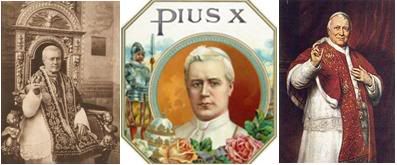 ST. PIUS X (1835-1914)
ST. PIUS X (1835-1914)
Pope, 1903-1914
OR today.
 No papal news in this issue other than yesterday's routine appointment.
No papal news in this issue other than yesterday's routine appointment.
Page 1 stories; Afghan election turnout greater than expected despite
Taliban attacks; Iraq back in the grip of fear following latest terrorist
bombings; North Korea claims to be ready for new talks on its nuclear
program. In the inside pages, two tributes to Alfred Hitchcock, particularly
for the film North by Northwest.
No scheduled events for the Holy Father today, but ...
THE POPE'S ARM CAST IS OFF

Here is a translation of the Vatican bulletin today:
VATICAN CITY
August 21, 2009
This morning, His Holiness, Benedict XVI, underwent removal of his armcast and means of (bone) synthesis [the wires used to hold the fractured bone in place as it healed] at the ambulatory clinic of the Apostolic Palace in Castel Gandolfo, which was specially equipped for the procedure.
The cast and wires were applied to the Pope's right arm last July 17 at a hospital in Aosta following a fracture of the right wrist.
The final outcome of the treatment was optimal. Functional recovery of the injured arm was immediately started and will be completed through an appropriate rehabilitation program.
Dott. Patrizio Polisca
[Modificato da TERESA BENEDETTA 21/08/2009 17:26] |
| |
 21/08/2009 18:57 21/08/2009 18:57 |
|
| | | OFFLINE | | Post: 18.237
Post: 894 | Registrato il: 28/08/2005
Registrato il: 20/01/2009 | Administratore | Utente Senior | |
|
 It is curious that this news should come on the annual feast of St. Pius X, hero and emblem of the traditionalists!
Objective:
It is curious that this news should come on the annual feast of St. Pius X, hero and emblem of the traditionalists!
Objective:
A single form of celebrating the Mass
which will unite the Church
by Andrea Tornielli
Translated from

August 21, 2009
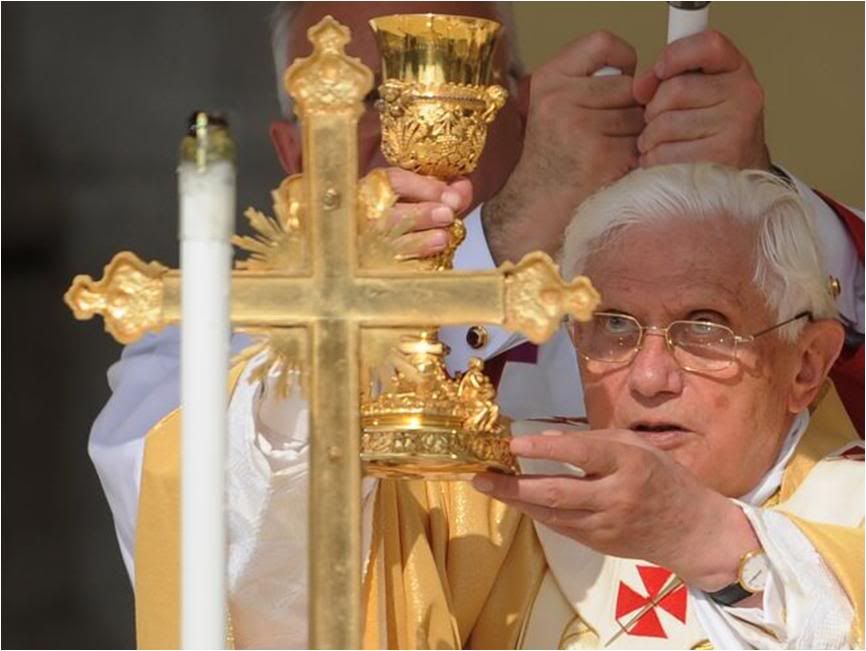
The Roman Catholic Church should have one single Mass form.
The present cohabitation of two forms - the ordinary, or the post-Conciliar reformed Mass, and the traditional Mass, liberalized two years ago through the papal Motu Proprio Summorum Pontificum - is difficult to 'manage'.
Ad the single Roman rite of the future "should be celebrated in Latin or the vernacular, but completely within the tradition of the Mass which has come down to us".
These are words which Cardinal Joseph Ratzinger, as Prefect of the Congregation for the Doctrine of the Faith, wrote to the German philologist Heinz-Lothar Barth, an advocate of the traditional rite.
The 2003 letter is published for the first time in the book Davanti al Protagonista [Facing the Protagonist] (Cantagalli, 2009) by Joseph Ratzinger-Benedict XVI, which will be previewed at the annual Meeting of Rimini (sponsored by Comunione e Liberazione) next week. The book is due for release next month.
The letter is significant because in 2003 - less than two years before he would be elected Pope - Ratzinger summarized his idea of the 'reform of the liturgical reform' which he believed should proceed gradually in order to recover the sense of the sacred and more adoration of God in the new Mass, through a compenetration of the traditional and the new forms, in which each would take the best from the other.
When the Bavarian cardinal wrote that letter, he could not have known that he would be the next Pope, and therefore that he himself who would fully liberalize the traditional rite, about which, he writes in the letter to Barth, "there is still too great an aversion from many Catholics, because of what has been insinuated to them for many years".
It is curious to note how this thinking by the future Pope - which did not change with his election - is opposed by elements from both the left and the right of the Church, i.e., by progressivists as well as by some traditionalists.
The latter, finally 'legitimized' after years of virtually being banned, consider the pre-conciliar rite as something fixed and perfect, something absolutely untouchable, and are irritated by any proposal to change it, even if it were simply by enriching the lectionary and by updating it to take account of new religious feasts decreed by the Church after the Council.
The progressivists - including many bishops and priests - consider Papa Ratzinger's liturgical ideas to be a 'betrayal' of Vatican-II, oppose the liberalization of 2007, and have sought to counteract it at every turn, considering it as nothing more than a ritualistic and somewhat folklorist obsession. For them, there is nothing that needs to be changed in the new Mass.
Benedict XVI has chosen a middle way, in some ways the most difficult one, which is bound to be opposed even more by the extremists on both sides.
The new book by Cantagalli, published within its series "Instruments for reform', edited by Alessandro Galeotti, also contains another previously unpublished text by Cardinal Ratzinger, in which the future Pope reiterates his often stated belief that liturgy should never be "the ground for experimenting on theological hypotheses".
"In these last few decades," he wrote, "theological conjectures by experts have entered too quickly into liturgical practice, often bypassing ecclesiastical authority, through local commissions who are know how to publice their consensus of the moment at the international level, and on the practical level, are able to translate these into liturgical law. Liturgy draws its grandeur from what it is, not from what we make of it."
This is an observation that continues to be very relevant, given the persistence of frivolity, distortions and true abuses in the liturgy.
The article is followed by a full text of the letter to Barth. Here is a translation:
To Dr. Heinz-Lothar Barth
23 June 2003
Dear Dr. Barth:
I thank you cordially for your letter of April 6 to which I only now find time to reply.
You ask me to engage myself actively for a fuller availability of the traditional Roman rite. In fact, you know that I am not deaf to such a request.
In the meantime, my work to promote this cause is well known.
To the question whether the Holy See "will re-allow the ancient rite anywhere and without restrictions", as you desire and may have heard spoken about, one cannot give a simple answer or furnish any evidence without effort.
The aversion of many Catholics - insinuated to them for so many years - is still too great against the traditional rite that they disdainfully call 'pre-conciliar'.
And one must deal with considerable resistance on the part of many bishops against a general re-authorization [of the traditional rite].
It is a different matter when one considers a limited re-acceptance (as) the demand for the ancient rite is limited.
I know, of course, that its value does not depend on actual 'demand' for it, but the question of the number of interested priests and laymen nonetheless plays a certain role.
Besides this, such a measure [of having a single form of the Roman rite] - at only 30 years since the liturgical reform effected by Paul VI - could only be effected gradually. Any undue haste will certainly not be a good thing.
Nonetheless, I believe that in the long run, the Roman Church should once again have a single form of the Roman rite. The existence of two official forms would be difficult to 'manage' in practice for bishops and priests.
The Roman rite of the future should take a single form, celebrated in Latin or the vernacular, but completely in the tradition of the rite which was handed down to us.
It could take on some new elements which have been proven to be valid, like the new religious feasts, some new Prefaces to the Mass, a broader Lectionary - better chosen, but not too many - an oratio fidelium, that is, a fixed litany of intercessions to follow the Oremus before the Offertory where it used to be.
Dear Dr. Barth, if you would be involved in working for the cause of liturgy in this manner, you will certainly not find yourself alone, and help to prepare "ecclesial public opinion' for eventual measures that will favor wider use of the older liturgical missals.
Nonetheless, one must be careful not to arouse expectations that are too high or maximal among the traditionalists.
I take the occasion to thank you for your commendable commitment to the liturgy of the Roman church in your books and lectures, even if here and there, I would wish more charity and understanding for the Magisterium of the Pope and the bishops.
May the seed you have sown germinate and bear much fruit for the renewed life of the Church, for which the liturgy is and should remain its 'source and culmination", indeed its true heart.
It is with pleasure that I impart the blessing you have asked.
Sincere greetings.
Joseph Cardinal Ratzinger
P.S. I must mention one recent story of great interest for followers of the liturgy - an interview with Mons. Domenico Bartolucci, emeritus director of the Sistine Chapel Choir, which ran in Disputationes Theologicae, an Italian-French site, and which has been translated in Rorate caeli (entry of August 12).
rorate-caeli.blogspot.com/
I will post a translation for the record in the CHURCH&VATICAN thread, soon I hope.
There's also a Xeptember 2007 editorial in La Civilta Cattolica, recalled to us by lella and her followers on

about the traditional liturgy. It was written on the occasion of the activation of Summorum Pontificum.
[Modificato da TERESA BENEDETTA 22/08/2009 13:48] |
| |
 22/08/2009 05:06 22/08/2009 05:06 |
|
| | | OFFLINE | | Post: 18.239
Post: 896 | Registrato il: 28/08/2005
Registrato il: 20/01/2009 | Administratore | Utente Senior | |
|
 Viterbo ready for the Pope
Viterbo ready for the Pope
by AUGUSTO CINELLI
Translated from

August 21, 2009
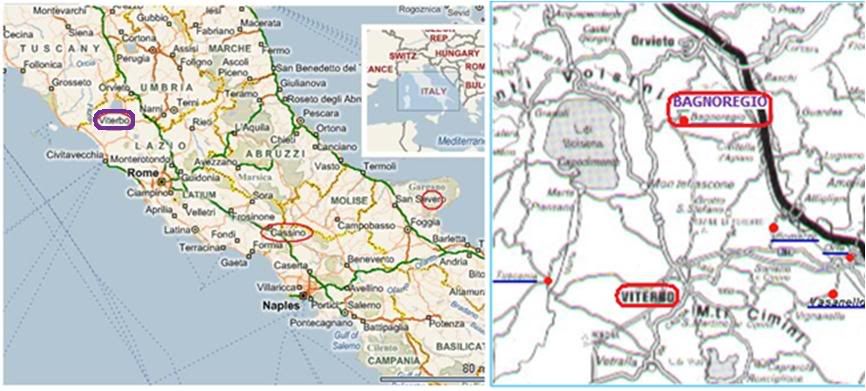
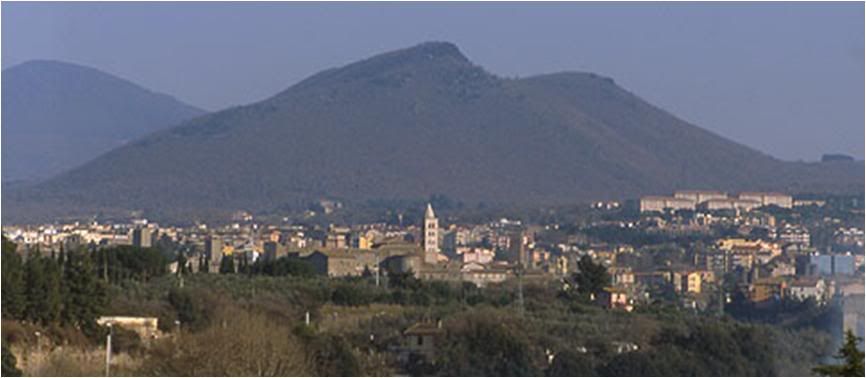
Fifteen days away from the pastoral visit of Benedict XVI to Viterbo and Bagnoregio on Sunday, Sept. 6, there is great ferment in the diocese of Viterbo and in all of the territory of Tuscia.
[Tuscia is the term for what was the heartland of Etruscan culture in Italy, a region bordering Tuscany, Umbria and the Rome metropolitan region, with Viterbo as its center. Present-day Tuscia occupies the northern part of the region of Lazio which includes the province and city of Rome.]
Organizers are placing the finishing touches to the preparations for the visit which is a collaboration between the Diocese and local institutions.
It will be the first papal visit to Viterbo since the creation in 1986 of the present Diocese of Viterbo from the reunification of five ancient dioceses - Viterbo, Tuscania, Motnefiascone, Bagnoregio and Acquapendente.
And it will be the second papal visit to the medieval City of the Popes since John Paul II visited in 1984; for Bagnoregio, hometown of St. Bonaventure, the first by a Pope.
Perhaps the choice of Viterbo for a papal visit was also dictated by Pope Benedict's personal connection to St. Bonaventure, a Doctor of the Church ('the Seraphic Doctor') and contemporary of St. Thomas Aquinas, who was born Giovanni Fidenza in Bagnoregio around 1217. [He was renamed Bonaventura (good fortune) after he was miraculously healed of a childhood illness by St. Francis of Assisi.
Bonaventure's theology of history was the subject of Fr. Joseph Ratzinger's dissertation in 1957 to qualify for his Habilitation as a German university professor. First published two years later in the original German under the title St. Bonaventure: The theology of history, it was recently re-published in Italy.
Thus, in the afternoon of his visit to Viterbo, the Pope will fly by helicopter to Bagnoregio and venerate the only relic of the saint in Italy, the 'holy arm' kept in the co-cathedral of San Nicola. {The rest of his body is in Lyon, where he died in 1284.)
The high point of the visit will be the Eucharistic celebration to start around 10:15 at the Valle Faul, the plain below the elevation on which the Palazzo dei Papi and the Cathedral of San Lorenzo are located.
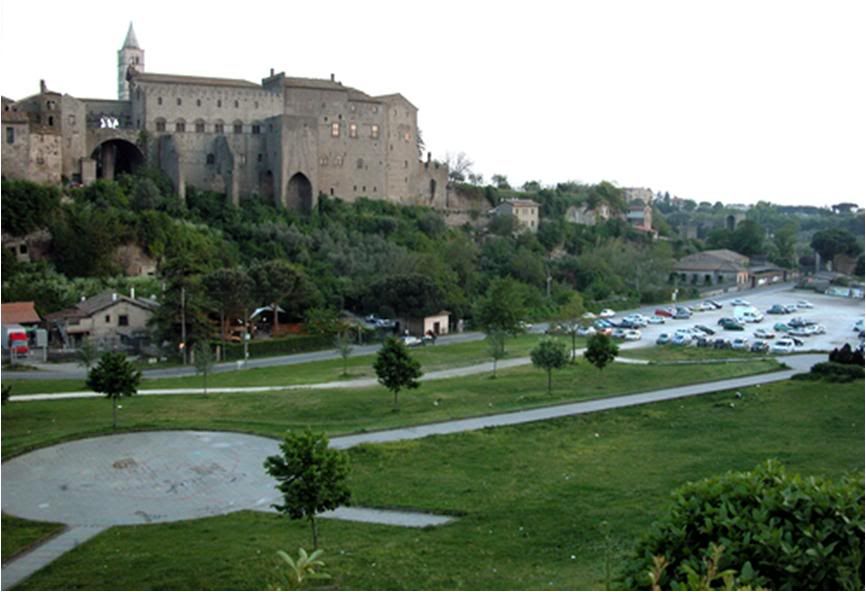
The organizers said that the plain has been prepared to accommodate the altar-stage for the Mass and a crowd of at least 10,000 who can be accommodated for the Mass adn the Angelus.
There will be jumbo TV screens at certain points of the city for those who have not tickets to the Mass.
Concelebrating with the Pope will be Cardinal Agostino Valli, the Pope's Vicar for the Diocese of Rome, 30 bishops from teh Lazio region adn at least 200 diocesan priests.
The Pope will also be paying homage to the other patron saints of the diocese - St. Rosa, co-patron of the city, and the Madonna della Quercia, a miraculous image of Mary venerated in a shrine outside Viterbo. (The shrine includes a monastery where the Pope will have lunch and his customary post-luncheon rest before undertaking his afternoon program.)
Since the day the pastoral visit was officially announced last December 8, the church community in Viterbo embarked on an intense program of spiritual preparation, with periodic interventions by the Bishop of Viterbo, Mons. Lorenzo Chiarinelli, who has said in his welcoming message: "The Church of Viterbo which has always been linked to Peter's Chair, welcomes the Successor of Peter to be confirmed in the faith,and with confidence in the future, cultivating among so many local examples of holiness, the fascinating message of St. Nonaventure of Bagnoregio".
The bishop has met with representatives of the various parishes and local church associations to give pointers on what must be emphasized to the faithful in their spiritual preparation.
He also appeared before the communal councils of both Viterbo adn Bagnoregio, meeting in extraordinary session, to describe the preparations for the visit. Last Wednesday, he met with the youth volunteers who will be assisting the faithful on the day of the visit.
Viterbo, where the Papal Conclave was born
Translated from

August 21, 2009
Benedict XVI will be the 55th Pontiff to visit Viterbo, which prides itself as the medieval City of the Popes.
Five Popes were elected here, and four of them are buried here.
In fact, from 1227-1281, Viterbo was the seat of the Papacy for political and military reasons, not to mention the therapeutic properties of its thermal springs, for which the city was known before then.
The papal residence was established in the Bishop's palace which was enlarged and renovated to the magnificence befitting a papal residence.
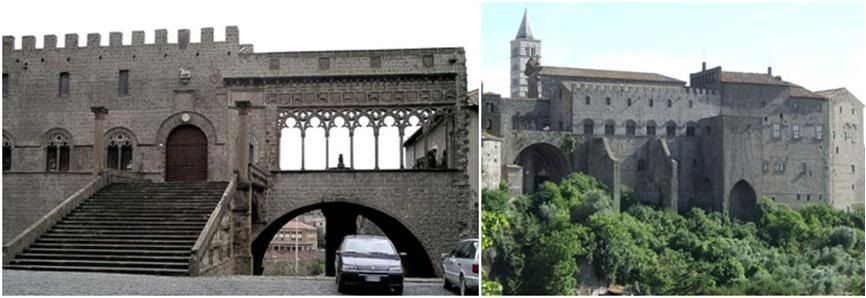 Front and rear views of the Palazzo dei Papi.
Front and rear views of the Palazzo dei Papi.
The complex - a symbol of medieval Viterbo - is known today as the Palazzo dei Papi, best known for its Conclave Hall.
The term 'conclave' from the Latin cum clave (under lock and key) was coined here on tehe occasion of the longest papal election in history: 36 months and a day.
In 127q1, the Viterbans, tried of three years of indecisions by the cardinals meeting to elect a success for Urban IV, locked them in the Great Hall of the apostolic palace, opening a part of the roof to give them air while they decided. And they did, within one day, electing Gregory V.
A new book, Viterbo e i Papi, prepared for the occasion of the papal visit, reconstructs after careful research the story of the presence of Popes in Viterbo up to the visits by Pius IX in 1857 and by John Paul II in 1984.
The book, written by Mons. Salvatore Del Ciuco, will be presented in a special edition to Benedict XVI, as well as to civilian authorities.
It contains previously unpublished accounts of the first Conclave of Viterbo, particularly the role played by St. Bonaventure in appealing to the cardinals to come to an agreement on their choice for Pope.
In this context, Benedict XVI's visit is seen as a splendid seal for the new millennium nine centuries after the Popes first came to Viterbo.
[Modificato da TERESA BENEDETTA 23/08/2009 02:06] |
| |
 22/08/2009 14:41 22/08/2009 14:41 |
|
| | | OFFLINE | | Post: 18.240
Post: 897 | Registrato il: 28/08/2005
Registrato il: 20/01/2009 | Administratore | Utente Senior | |
|

Saturday, August 22
 THE QUEENSHIP OF MARY
THE QUEENSHIP OF MARY
OR today.
 The only papal story in the issue is a a brief item that the Holy Father's arm cast
The only papal story in the issue is a a brief item that the Holy Father's arm cast
was taken off yesterday. Page 1 stories: Btoh candidates claim victory in Afghan
presidential elections but electoral commission says results will not be known till
August 25 at the earliest; China pr0jects 8.5% growth in 3rd quarter of 2009 after
record 7.9% in the 2nd quarter; Iran authorizes IAEA to inspect a nuclear plant
in Arak; North Korea puts out more signals it wants to dialog; and as more small
boats with African migrants reach Italy seeking a new home, five Eritreans who
survived 20 days in the open sea after their boat capsized killing 73 of their
companions, claim dozens of ships passed them without stopping to help - Italy will
investigate such violation of the international law obliging help on such occasions.
No bulletins so far from the Vatican Press Office.
|
| |
 22/08/2009 16:11 22/08/2009 16:11 |
|
| | | OFFLINE | | Post: 18.241
Post: 898 | Registrato il: 28/08/2005
Registrato il: 20/01/2009 | Administratore | Utente Senior | |
|
 Benedict XVI's reform
Benedict XVI's reform
of the liturgical reform:
NO to receiving the Host
in one's hands
by Andrea Tornielli
Translated from

August 22, 2009
A document handed to Benedict XVI on the morning of April 4 by Cardinal Antonio Canizares Llovera, Prefect of the Congregation for Divine Worship. contained the results of a private vote, taken March 12, at the plenary assembly of the CDW, and may well be the first formal step towards the 'reform of the llturgical reform' that Joseph Ratzinger has spoken and written about countless times.
By near-unanimous vote, the cardinals and bishops who are members of the CDW voted to uphold more 'sacredness' in the Mass, a recovery of the sense of Eucharistic Adoration, and a revision of the introductory parts of the Novus Ordo missal in order to rein in abuses, experimentation and inappropriate 'creativity'.
They also favor a re-statement that the usual way of receiving Communion under existing norm is not in the hands, but on the mouth. it is true that there was an indult which allowed, upon the request of a diocese, allowing priests to distribute Communion on the palm of the hand, but this was an exceptiona and should remain so.
[Mons. Guido Marino, the papal master of liturgical ceremonies, pointed out this norm in 2007 when the Pope first started giving Communion on the mouth. I had expected an outcry from outraged bishops and progressives who - for some reason someone still has to write a good story on - have long behaved as though Vatican-II had also abolished the practice of Communion on the mouth, but it never came. I have never been able to think of a reason why anyone would ever have proposed receiving the Host in the hands. Even for practical reasons, it is not convenient and quite unhygienic.
The lack of an outcry is probably because no one could possibly 1) argue against receiving Communion on the mouth and 2) claim that receiving the Host in one's hands is infinitely the better way. Of course, they may well argue - once the Church re-states the norm formally - that people have been used to receiving the Host in the hands for 40 years now, and one should not make them change. But this is an argument that they would never apply to the fact that the traditional Mass has been celebrated in that form since the Council of Trent more than 500 years ago! And yet they thought nothing of chucking it overboard virtually overnight in 1969.
Well, it is high time the norm of reciving Communion on the mouth, preferably in a kneeling position, be dusted off and presented to the faithful anew!]
Cardinal Canizares, the Pope's 'minister for the liturgy', has also ordered a study of considering a return to saying the Mass ad Orientem, at least at the moment of the Consecration.
Before Paul VI's 1969-1970 liturgical reform, all Masses were said with both the priest and the congregation facing the altar (representing the East, the direction of the rising Sun, symbol of Christ), or as the progressives and secular press like to say, with the priest turning his back on the congregation.
[Of course, the expression 'turning his back on the congregation' betrays the progressive bias that it is the congregation who matters most during Mass - which they consider to be a communal banquet rather than recreating Christ's Sacrifice - and not Christ in whose name the Sacrifice is re-created and offered! I should really check whether Sacrosanctum consilium provides explicitly for the 'kumbaya' setting adopted in the Novus Ordo!]
Those who know Cardinal Canizares, who was called 'the little Ratzinger' during his time at the Congregationf or the Doctrine of the Faith, know that he fully intends to carry forward the Pope's 'reform of the reform', on the basis of what Vatican-II actually prescribed in Sacrosanctum concilium, much of it ignored zand therefore 'overruled' by the liturgical reforms set in place in 1969-70.
In an interview with the monthly magazine 30 GIORNI a few months ago, the Spanish cardinal said in that regard: "Changes were made for the simple desire to make a change from the past, which was considered all negative and therefore to be overcome. Liturgical reform was considered a rupture with tradition, rather than an organic development of Tradition."
The 'propositions' voted on the CDW members last March also include encouraging the use of Latin in diocesan celebrations, at least during the major Church feasts, and the publication of bilingual Missals containing the Latin text of the Mass with the vernacular translation (such as even Paul VI himself had wanted).
The DCW 'propositions' submitted to the Pope are perfectly in line with what Cardinal Joseph Ratzinger had often expressed about the ways in which Vatican-II's intentions for liturgical reform ended up being ignored, distorted and abused.
Such ideas were also expressed in the previously unpublished excerpts taken from the book Davanti al Protagonista (Cantagalli), a collection of Joseph Ratzinger-Benedict XVI's texts on liturgy, which is coming out next month in Italy and will be previewed at the Comunione e Liebreazione annual Meeting in Rimini next week.
Cardinal Ratzinger was always careful to note that carrying out a 'reform of the reform' would take time and must be undertaken gradually. The Pope is convinced that acting in haste will not be useful, and that directives should not simply come from the top but must have some momentum among priests and faithful in order not to end up being dead letters.
Ratzinger's reform style has been one of honest confrontation and above all, of leading by example. As he did with giving Communion to persons kneeling and receiving the Host on the mouth.
 Ratzinger-Benedict XVI proves consistent:
Ratzinger-Benedict XVI proves consistent:
His defense of liturgy from abuses
shows the same rationale as
lifting the FSSPX excommuications
by Martino Cervo
Translated from

August 21, 2009
A few months after publishing some previously unpublished writings of Karol Wojtyla, Cantagalli publishing house is coming out with a collection of Joseph Ratzinger-Benedict XVI's writings on liturgy, including two that had been previously unpublished.
The book Davanti al Proagonista (Before the Protagonist) will be previewed at the annual C&L Meeting at Rimini which opens tomorrow.
Gathered together, Joseph Ratzinger's positions on the sensitive question of post-Vatican II liturgical reforms provide a key to understanding the controversies linked to the Council, often reduced to a simple feud between conservatives and progressivists, between political left and right.
The more interesting of the 'new' material [both 'unpublished' texts were available online] is the letter to the traditionalist advocate Heinz-Lothar Barth, dated June 23, 2005 (less than two years before Ratzinger would be elected to succeed John Paul II), which is translated for the first time in Italian.
The cardinal responds to Barth's appeal that he involve himself more actively in the efforts to re-institute the traditional Mass into the Church - as Benedtc VXI would do on July 7, 2007, with the Motu Proprio Summorum Pontificum.
ACtually, the cardinal's letter shows the clarity of judgment which would also lead him eventually to revoke the excommunication of the four FSSPX bishops consecrated without Vatican permission by Mons. Marcel Lefbevre.
The key sentence in the future Pope;s letter says: "The Roman rite of the future should take a single form, celebrated in Latin or the vernacular, but completely in the tradition of the rite which was handed down to us".
Once again, what prevails is the desire for unity which overrides any schematics regarding liturgy, which, according to Cardinal RAtziinger, "must not be ground for experimentation of theological hypotheses" sicne liturgy "draws its grandeur from what it is, not from what we make of it".
There is no trace od mere traditionalism, but rather - as the other writings in the book consistently show - an insistent and powerful appeal in behalf of liturgy itself as an expression of Christianity, as the personal participation of every Christian in the mystery of Christ's death and resurrection.
Without this key illumination, one cannot understand the disputed act of mercy that the Pope carried out for the Lefebvrians, which was unfortunately aggravated by the Holocaust-denying statements of one of the FSSPX bishops.
But the letter to Barth reveals, at a time beyond 'suspicion', what Ratzinger's true concern was: to hold together in the single liturgy of the Roman rite all those who acknowledge Christ as man's salvation, the answer to man's questions.
A liturgy that is immutable in substance because Christianity's doctrine remains unchanged, even as it continuously regenerates as a 'compagnia sempre riformanda' - as Benedict XVI, denounced and tagged as nothing but a 'conservative' in the worst sense, characterizes the Church that he leads.
And with a good dose of prophecy, Ratzinger makes a concluding remark in the letter, which has become applicable to himself and the opprobrium he has attracted from heterodox members of the Church: "...here and there, I would wish more charity and understanding for the Magisterium of the Pope and the bishops."
"May the seed you have sown germinate and bear much fruit for the renewed life of the Church, for which the liturgy is and should remain its 'source and culminatio', indeed its true heart," he concludes.
More than a theological concern, his intuition appears sustained by an anthrology - quite Thomistic and Christinaly realist - which emerges in the other previously unpublished work presented in the chapter on "The theology of liturgy" [which is also the title of Volume 1, collecting all his writings on liturgy, in The Collected Works of Joseph Ratzinger, so far published only in German].
The text is a lecture given by the Cardinal in July 2001. Just as with the Lefebvrians or with the traditional Mass, Ratzinger's concern is not about 'steering to the right', but he does make clear that reforms in the Church and in the liturgy cannot consist in progressivist revisions intended to 'adapt' the Church to the times.
Rather, keeping in minr the lessons of St. Bonaventure of Bagnoregio in his theology of history, Ratzinger suggests an 'ablatio' - a subtraction that reduces doctrine to the bare essential truth and to exalt it, namely to Christ who gives himself to mankind and to each human being.
This is the only reform - a personal one of relationship with Christ - which can and should animate the Church. A conversion, not a formula; an event, not a theory.
That is why, even in considering the Paschal mystery, Ratzinger negates all dualisms: Christ on the Cross is history and faith, an event of God-made-flesh on earth, sacrifice and redemption.
Even if, he notes, contemporary thinking is divided: "Our image of God," he writes. "has faded. It is closer to deism. Modern man cannot imagine how the human being could possible do harm to God, much less that man needs to expiate himself before God."
Faith, he writes, 'does not see the finite as negation but as creation". He echoes Thmas Aquinas with his trust in the senses and in things - in perceived reality - as 'good things', in the words of Genesis.
And he opens wide the doors of a faith which, through liturgy, reveals and fulfills a step of reason rather than theology.
[Modificato da TERESA BENEDETTA 24/08/2009 14:52] |
| |
 22/08/2009 17:25 22/08/2009 17:25 |
|
| | | OFFLINE | | Post: 18.243
Post: 900 | Registrato il: 28/08/2005
Registrato il: 20/01/2009 | Administratore | Utente Senior | |
|
 The sixth essay in FIRST THINGS's online symposium on CIV is one of those rare 'internalizations' of the encyclical that go beyond facile surface reading.
Benedict XVI, Economist
The sixth essay in FIRST THINGS's online symposium on CIV is one of those rare 'internalizations' of the encyclical that go beyond facile surface reading.
Benedict XVI, Economist
by Ivan Kenneally

August 21, 2009
Benedict XVI recently issued his third and greatly anticipated encyclical Caritas in Veritate and it was immediately parsed by political analysts and operatives for partisan evidence of their Catholic bona fides.
Liberals were generally pleased that the Pope criticized the excesses of capitalism and globalization, extolled the virtues or property redistribution [I don't think Benedict XVI has ever used the term 'property redistribution' which is outright socialistic - he is always careful to say 'equitable distribution of the world's resources", Note 'equitable' not 'equal'!], and defended the claims [not the 'claims' - the 'rights'!] of labor unions.
Even better, they were dizzy with enthusiasm regarding his call for the creation of a “true world political authority” to protect the disenfranchised from systemic poverty.
It’s easy to forget that only a few years ago the Pope was roundly criticized by liberals for his anachronistic attachment to conservative values and tradition; now with one encyclical he has become fully rehabilitated and, in the grand tradition of Jeremiah Wright, is an important spiritual advisor to President Obama. To hear the liberal embrace of the latest encyclical’s economic recommendations, one would think it was co-authored by Larry Summers.
However, liberals who scrutinize the document with the care it deserves will find their celebration has been premature.
First of all, the encyclical is not an economic policy paper with the primary intention of advocating any particular institutional program.
Benedict goes to great pains to stress from the beginning that the Catholic Church “does not have technical solutions to offer” and that its central concern is not economic development per se but “integral human development,” or the understanding of true human progress as a “vocation.”
For Benedict, a proper understanding of the challenges to our moral development “requires further and deeper reflection on the economy and its goals” but this is only a first step towards bringing about a “profound cultural renewal” that could not legitimately be captured by the technical language or categories of academic economics.
In fact, the entire encyclical is marked by a principled skepticism regarding any political or institutional response to a set of problems that “are not primarily of the material order.”
Generally speaking, “institutions by themselves are not enough” partly because, like individuals, they are vulnerable to corruption and partly because any genuine moral progress “involves a free assumption of responsibility in solidarity by everyone” that is negated by excessive state coercion.
More specifically, Caritas in veritate is devoted to the virtue of charity understood in light of the “commitment to the common good” which has “greater worth than a merely secular or political stand would have.”
According to Benedict, true charity is an individual vocation that can only be properly practiced by a free and responsible person — its exercise surely has political implications but is not first and foremost a political virtue.
While charity “demands justice” it also “transcends justice” —authentic charity is not reducible to some technocratic mechanism or easily encouraged by bureaucratic regulation. Rather than a duty of the state, it is an obligation of the soul.
The “great challenge” that confronts us is today is the apparently irrepressible fact of globalization or what the Pope calls an “explosion of worldwide interdependence.”
In itself, globalization is neither good nor bad — if “suitably understood and directed” it can function as an engine of economic growth, opportunity, and prosperity and, if “badly directed,” can lead to unprecedented levels of poverty and oppression.
The political problem of globalization, according to Benedict, is that the “new context of international trade and finance” which corresponds to the “increasing mobility of financial capital and means of production” exposes and strains the limitations to the sovereignty of the modern state.
In other words, the world of finance continues to become more fluid and truly international while the moral stewardship of international exchange is still largely conducted by compartmentalized states, some of which are incapable of properly competing and others who are shamefully predatory.
This is not intended as a justification for simply dismissing sovereignty (a conclusion the Pope calls “precipitous”) — it should be the case that that increased access to the global marketplace and increased wealth and economic self-sufficiency will produce greater and stronger opportunities for national self-determination.
Nevertheless, the pope’s abiding fear is that globalization has the potential to “undermine the foundations of democracy” and disguise economic warfare as collaboration.
So while the Pope does recommend the establishment of a “true world political authority” this shouldn’t be thoughtlessly conflated with something akin to Al Gore’s recent call for “global governance.”
Benedict is careful to point out that any international institution must be authentically democratic and devoted to the fostering of democracy among its members and that any centralization of power must be appropriately deferential to the “involvement of local communities in choices and decisions” that ultimately affect their own economic fate.
While he wants to protect poorer countries from abuse and destitution he also recognizes that they are often to blame for their economic failures and that it is imperative any such federation work toward “sustaining the productive capacities of rich countries.”
Benedict never argues that profit is evil or that free markets are inherently immoral — his argument is that “without internal forms of solidarity and mutual trust, the market cannot completely fulfill its proper economic function.”
In fact, what he most deeply pines for is the opportunity for individuals to “freely choose to act according to principles other than pure profit, without sacrificing the production of economic value in the process.”
This is not a condemnation of free markets as immoral but rather a reflection on the dangers posed to both freedom and markets when economic activity is completely delinked from “fully human outcomes.”
Today, the advocacy for greater and more centralized regulation is almost always attached to an ideologically dogmatic dismissal of capitalism and free markets.
Sadly, the recognition of the moral and political limitations (as well as economic) of an excessively “consumerist” and “hedonistic” approach to economics usually brings with it the unwelcome baggage of socialistic paternalism.
At the heart of this updated Marxism is the pregnant expectation of a post-political triumph that finally discovers technocratic solutions to what has traditionally been considered permanent political problems.
Benedict distinguishes himself from these fantasies by reflecting on the “danger constituted by utopian and ideological visions” that hastily dismiss political reality thereby placing its “ethical and human dimension in jeopardy.”
Whatever the ultimate promise of globalization may be, there are limits to the kind of human community we can build for ourselves—we are rightfully animated “to some degree by an anticipation and prefiguration of the undivided city of God,” but we never “overcome every division and become a truly universal community.”
Original sin — the fact of our “wounded natures” — will always express itself in the necessary imperfection of every human arrangement. So, for all of Benedict’s discussion of a world political authority, only “God is the guarantor of true human development.”
For Benedict, globalization is not merely the result of blind and impersonal Historical forces but rather the organic outgrowth of our deep longing for spiritual unity.
While the family, and by extension the local community, are the most natural stages for moral flourishing, we are “constitutionally oriented towards ‘being more,’” always striving to further approximate the image of God in which we are made.
This basic and intestinal inclination towards transcendence expresses itself in the technological dimension of our freedom as well, evidenced by our ceaseless attempts to conquer and control the forces of nature by our own efforts.
The grave danger, what the Benedict identifies as the “cultural and moral crisis of man,” is that by “idealizing” either economic or technological progress as the ultimate human goals we detach them both from moral evaluation and detach ourselves from moral responsibility.
Both of these idealizations produce the intoxicating sensation of our own self-sufficient “autonomy” or “absolute freedom” that “seeks to prescind from the limits inherent in things.”
Our freedom, the Pope argues, must always be understood in conjunction with our moral responsibility, rooted in a recognition of that which limits us. [Ah, but those who relativize everything because they claim there can be no absolute truth, do in fact claim that freedom must be absolute, i.e., not bound to any responsibility, moral or otherwise, only to its total and unbounded expression!]
Our gravitational pull towards “being more” should never be confused with the possibility of “being anything” — the pernicious and radically un-conservative pretense that our being is the product of ex nihilo self-construction has the paradoxical consequence of reducing our existence to “being nothing.”
The Church has no intention of simply opposing globalization precisely because its deepest causes are to be found in the spiritual composition of man.
In fact, our moral desire for solidarity is a temporal expression of our desire to find communion with the whole of humanity in the Kingdom of God and the “recognition that the human race is a single family.”
Following Paul, Benedict XVI affirms that the Church can be seen as an authority on globalization largely because of its “characteristic attribute: a global vision of man and the human race.”
Because of the insuperable limitations on political life, however, the “principle of solidarity” must always be counterbalanced by the “principle of subsidiarity” or the “expression of inalienable human freedom.”
The combination of these allows the Church to navigate between the two excesses of unfettered “social privatism” and an unwieldy “paternalistic social assistance.”
It is precisely this balance that allows Benedict to distinguish his view from “various forms of totalitarianism” which, unlike Christianity, attempt to “absorb” the individual, effectively “annihilating his autonomy.”
The statist argument typical of the American left — that economic activity must be politically managed by a bureaucratic elite for a collective moral end — has been so decisively discredited that it has made it difficult for conservatives to criticize the real moral inadequacies of free market capitalism.
A moral criticism of mercenary economic activity, especially with respect to the stress and dislocation it can visit upon the family, is deeply conservative in spirit.
The reflexive distancing evident in so many otherwise conservative quarters from the encyclical’s moral teaching is powerful evidence that conservatism today is often overrun by its libertarian wing, especially when it comes to matters of the market.
Still, what could be more conservative than the argument that while freedom certainly demands its proper due, it is the requisite condition of virtue rather than the whole of it?
In the narrow sense, Benedict is not so much concerned with globalization as an economic phenomenon but rather the “underlying anthropological and ethical spirit” of globalization and its “theological dimension.”
It could be argued that this is economics in the grand sense as understood by the founder of capitalism, Adam Smith — that it is a subdivision of moral philosophy.
This is what the Pope seems to mean when he contends that “every economic decision has a moral consequence.” Benedict’s economics respects the promise of free markets and also recognizes their failings — pervasive globalization both threatensand supports the “inviolable dignity of the human person.”
This means that the central “social question has become a radically anthropological question” and that economics must become part of a “truly integral humanism” that respects not only profit but the moral condition of those who pursue it. This should be a conclusion that conservatives can happily embrace.
Ivan Kenneally, assistant professor of political science at the Rochester Institute of Technology, is currently writing a book on American politics and the problem of technocracy. He blogs at Postmodern Conservative.
[Modificato da TERESA BENEDETTA 22/08/2009 21:56] |
| |
 22/08/2009 22:43 22/08/2009 22:43 |
|
| | | OFFLINE | | Post: 18.248
Post: 905 | Registrato il: 28/08/2005
Registrato il: 20/01/2009 | Administratore | Utente Senior | |
|

 John Thavis does a good service here, focusing on one of the multiple topics that the Holy Father touches on in CIV. I only wish that he - or other Catholic media writers - would have attempted, or will attempt, a systematic discussion of the individual themese that come up in CIV as they come up in the encyclical. That would be one useful way of adequately dealing with the breadth of the encyclical... I took the liberty of substituting IT (information technology) for the word 'communications' Thavis uses in his title, as it is much more descriptive of the phenomenon.
The Pope and the new media:
John Thavis does a good service here, focusing on one of the multiple topics that the Holy Father touches on in CIV. I only wish that he - or other Catholic media writers - would have attempted, or will attempt, a systematic discussion of the individual themese that come up in CIV as they come up in the encyclical. That would be one useful way of adequately dealing with the breadth of the encyclical... I took the liberty of substituting IT (information technology) for the word 'communications' Thavis uses in his title, as it is much more descriptive of the phenomenon.
The Pope and the new media:
A wary approach to the IT explosion
By John Thavis

VATICAN CITY, Aug. 21 (CNS) -- Toward the end of his encyclical Caritas in veritate, Pope Benedict XVI included a brief but strongly worded analysis about the "increasingly pervasive presence" of modern media and their power to serve good or immoral interests.
The two pages on communications were barely noticed in an encyclical that focused on economic issues, but they underscored the Pope's cautionary and critical approach to today's media revolution.
In particular, the Pope zeroed in on the popular assumption in the West that the penetration of contemporary media in the developing world will inevitably bring enlightenment and progress.
"Just because social communications increase the possibilities of interconnection and the dissemination of ideas, it does not follow that they promote freedom or internationalize development and democracy for all," the Pope wrote.
The Pope's critique made several important points:
- The mass media are not morally "neutral." They are often subordinated to "economic interests intent on dominating the market" and to attempts to "impose cultural models that serve ideological and political agendas," he said.
- The media have a huge role in shaping attitudes, a role that has been amplified by globalization. That requires careful reflection on their influence, especially when it comes to questions of ethics and the "solidarity" dimension of development, he said.
- Media have a civilizing effect when they are "geared toward a vision of the person and the common good that reflects truly universal values." That means they need to focus on promoting human dignity, be "inspired by charity and placed at the service of truth," he said.
Inspired by charity? That may sound overly idealistic to those familiar with some of the more popular talk-radio shows or blogs these days.
Archbishop Claudio Celli, president of the Pontifical Council for Social Communications, said recently that the Pope is not naive about what's out there.
"He knows perfectly well what's circulating on the great networks of information. That's why he says we need to reflect on the distribution of words and images that are degrading to the human person, and put a halt to whatever fuels hatred and intolerance, or whatever wounds the beauty and intimacy of human sexuality," the archbishop said.
Archbishop Celli, who has pioneered some of the Vatican's new media initiatives, said that while the Pope wants to affirm the opportunities of the media explosion he will voice concern when needed.
One example is the concept of friendship: The Pope believes it's an important element of the digital age, but risks being trivialized.
"It would be sad if our desire to sustain and develop online friendships were to be at the cost of our availability to engage with our families, our neighbors and those we meet in the daily reality of our places of work, education and recreation," the Pope wrote in his annual message to communicators earlier this year.
Pope Benedict faces a challenging task when it comes to communications. The 82-year-old Pontiff is definitely old school, preferring books to videos and expressing his most important ideas in documents that he writes out longhand.
At the same time, his aides have gone to great lengths to portray the Pope as a friend of new media, featuring him in text messages, YouTube videos and podcasts.
Yet Pope Benedict's teaching style is not easily reduced to sound bites or video clips. Even his off-the-cuff remarks come across as carefully reasoned.
Moreover, the Pope has found that his core message -- the importance of faith in God and the power of the Gospel to change lives -- often fails to make the news ticker.
Media interest perks up when there's a Vatican controversy, but not when the Pope talks about the need for saints in modern society.
Even the Pope's long-awaited encyclical on economic justice, timed for release as the world's leaders were meeting to tackle the global financial crisis, was bumped off network newscasts and relegated to the inside pages of newspapers by an event too big to ignore: the massive memorial service the same day for Michael Jackson.
It's doubtful any of this surprises Pope Benedict. Several years ago, he commented on the church's relationship with the media in his interview-book [with German journalist Peter Seewald] Salt of the Earth.
"The convictions and modes of behavior that hold the Church together are located at a deeper level than the forms of expression and behavioral patterns that are imposed on us by the mass media," he said.
That's no sound bite, either, but it reflects the Pope's caution against presuming that today's media culture is on the Church's wavelength.
It also implies that the media themselves should be a major target of modern evangelization.
[Modificato da TERESA BENEDETTA 22/08/2009 22:48] |
| |
 23/08/2009 17:43 23/08/2009 17:43 |
|
| | | OFFLINE | | Post: 18.250
Post: 907 | Registrato il: 28/08/2005
Registrato il: 20/01/2009 | Administratore | Utente Senior | |
|

Sunday, August 23
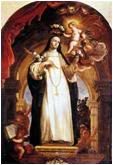 ST. ROSA OF LIMA (Peru, 1586-1617)
ST. ROSA OF LIMA (Peru, 1586-1617)
Virgin, Patron of Peru
First saint from the New World
OR today.
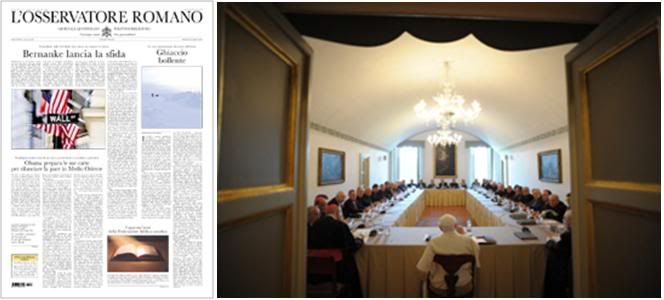 The only papal story in this issue is not on Page 1 - on the coming Ratzinger Schuelerkreis seminar at Castel Gandolfo.
The only papal story in this issue is not on Page 1 - on the coming Ratzinger Schuelerkreis seminar at Castel Gandolfo.
Page 1 stories: Countries race to explore Arctic resources to take advantage of melting glaciers; US Federal Reserve
seeks new measures to sustain economic recovery; Obama prepares to launch a new Middle East peace proposal.
The inside pages have four very good articles on the state of Biblical interest around the world on the 40th
anniversary of the Catholic Bible Federation.
THE POPE'S DAY
Sunday Angelus - The Holy Father was seen for the first time in public with his 'uncast' right arm. In his mini-homily
on today's Gospel, he underscored that Christianity is not an easy faith to follow as Jesus warned his disciples, but
Christians, despite their human frailties, should trust in the Holy Spirit to achieve communion with Christ.
The Vatican released the text of the Pope's message greeting Comunione e Liberazione at the opening today
of their annual Meeting for Friendship Among Peoples in Rimini on the theme "Getting to know Christ is always
an event", a theme dear to Benedict XVI.
[Modificato da TERESA BENEDETTA 23/08/2009 17:44] |
| |
|
|
|
|